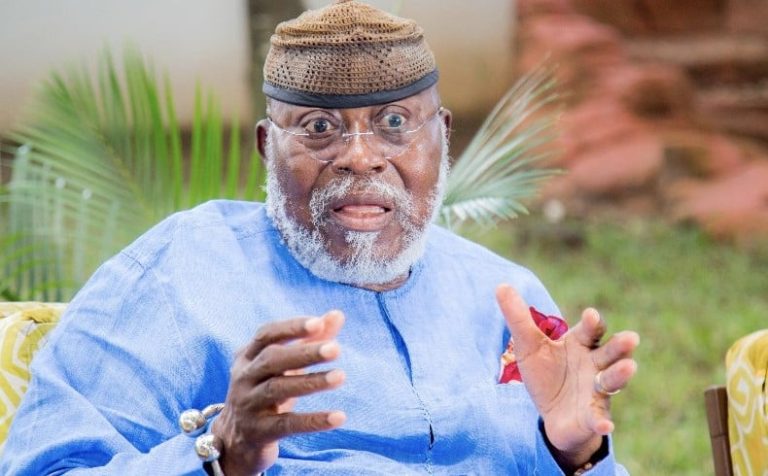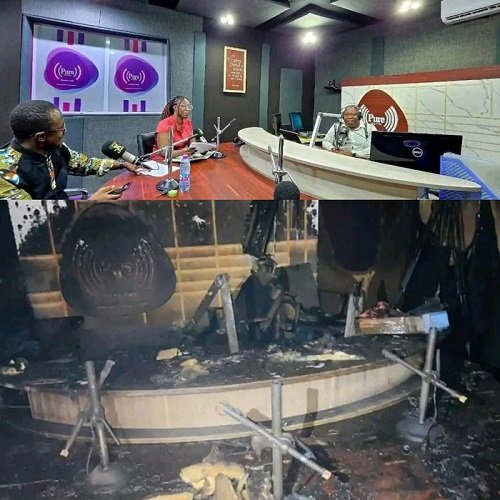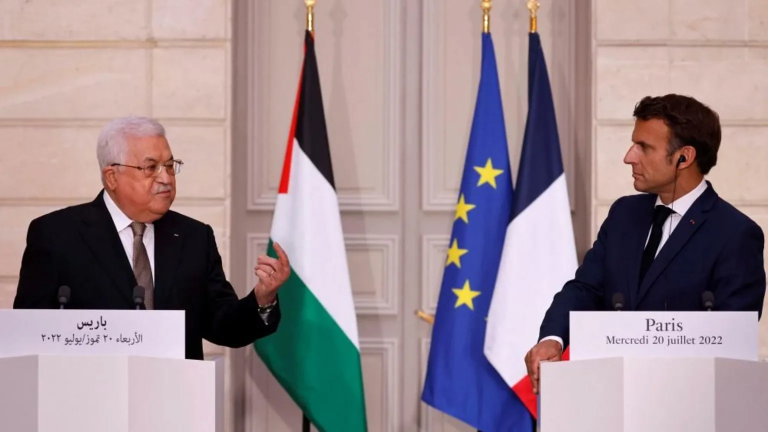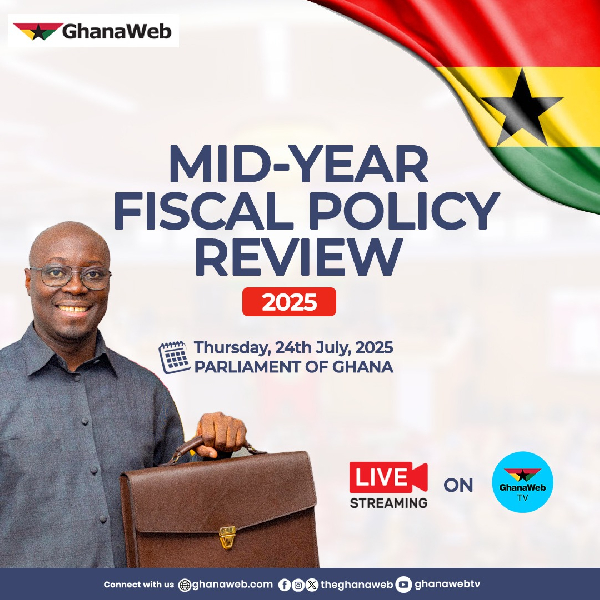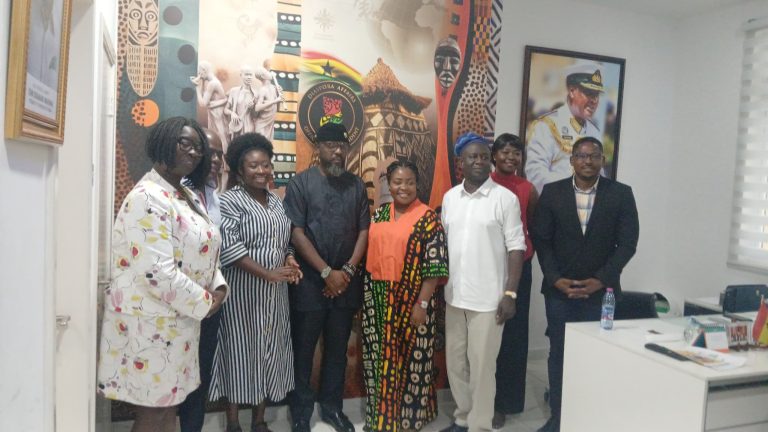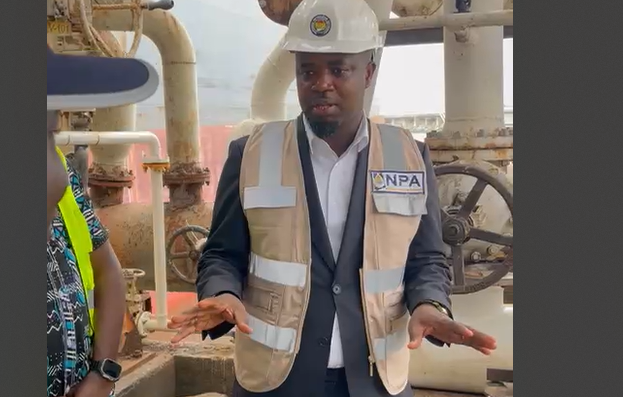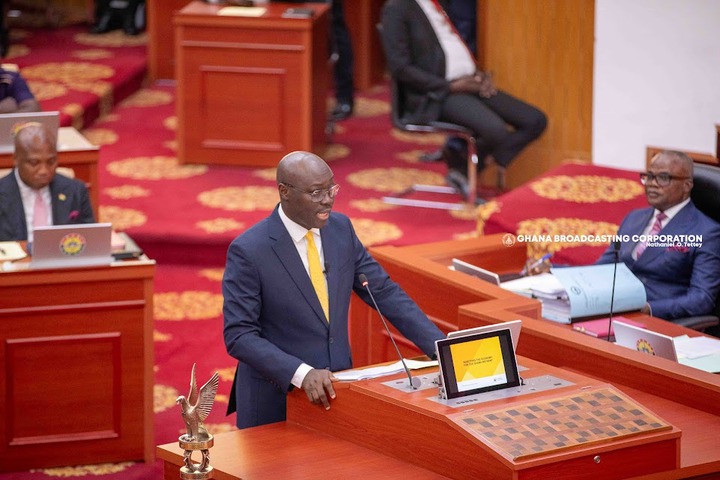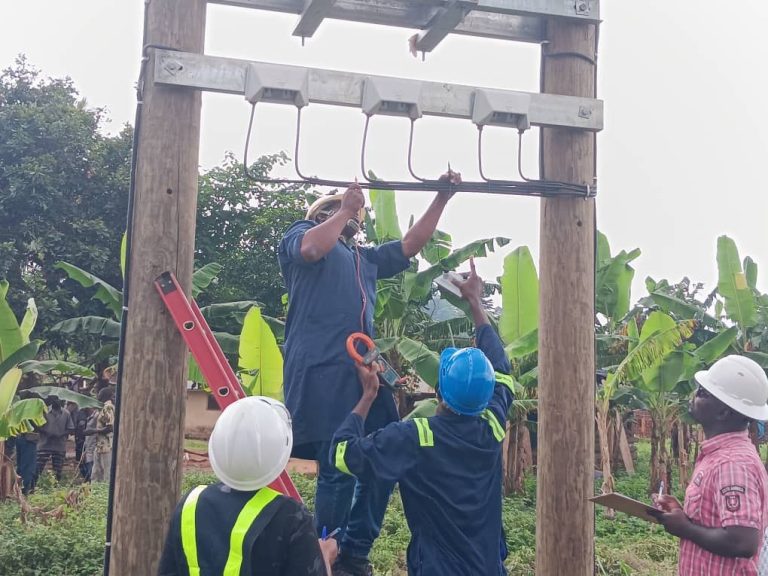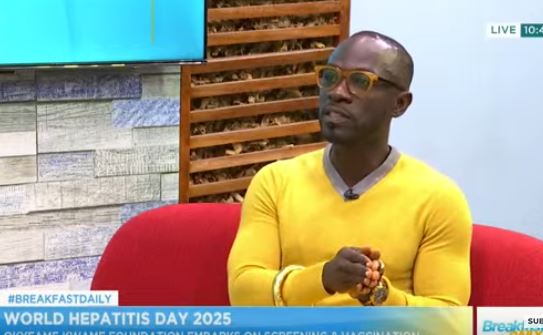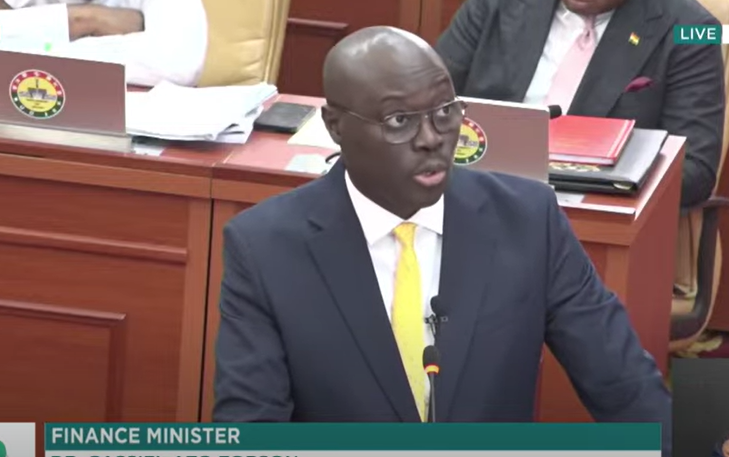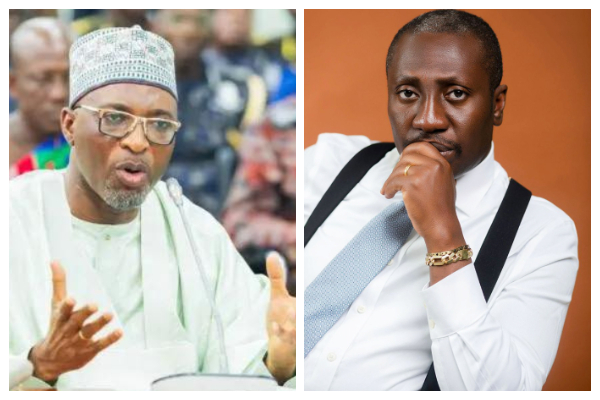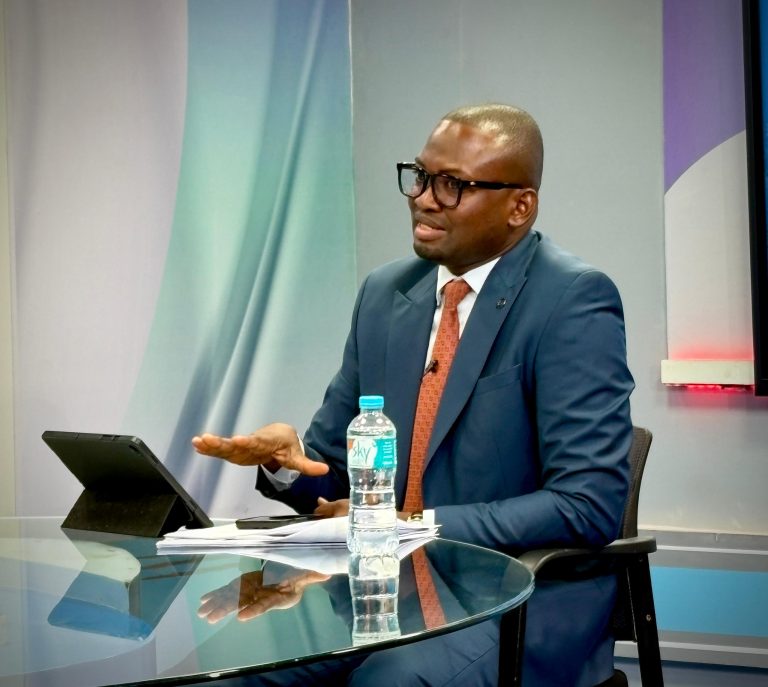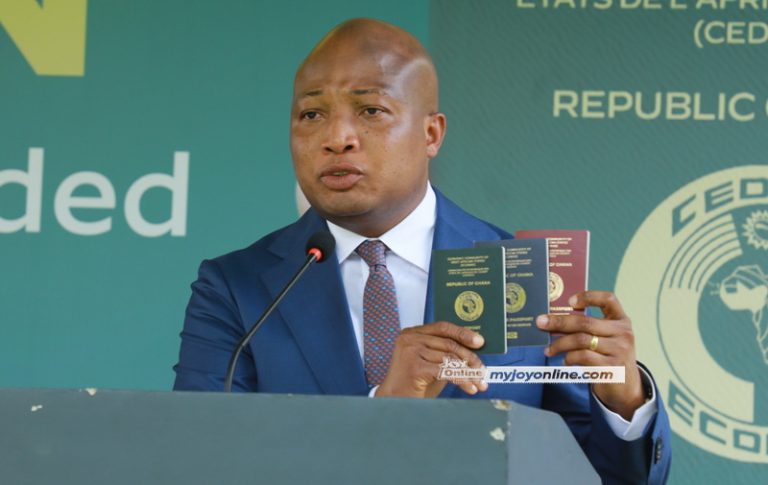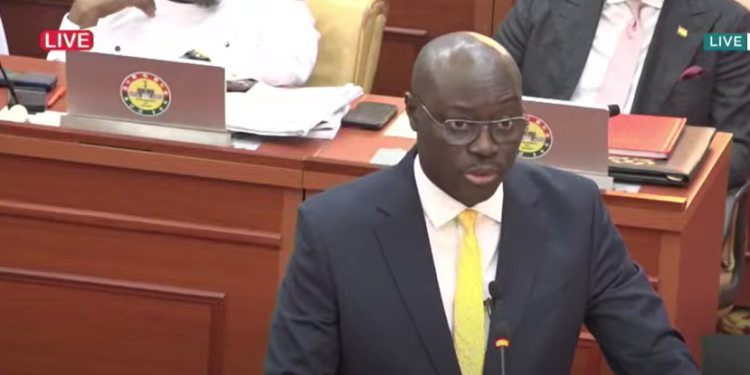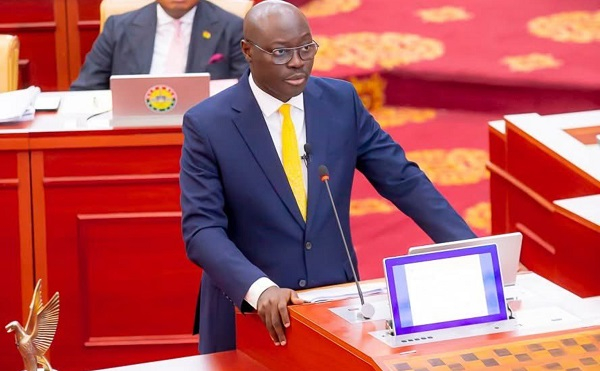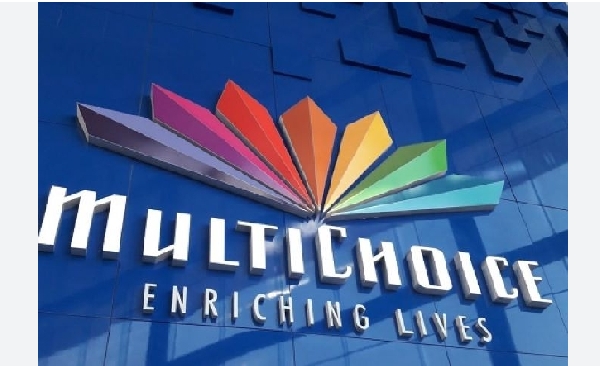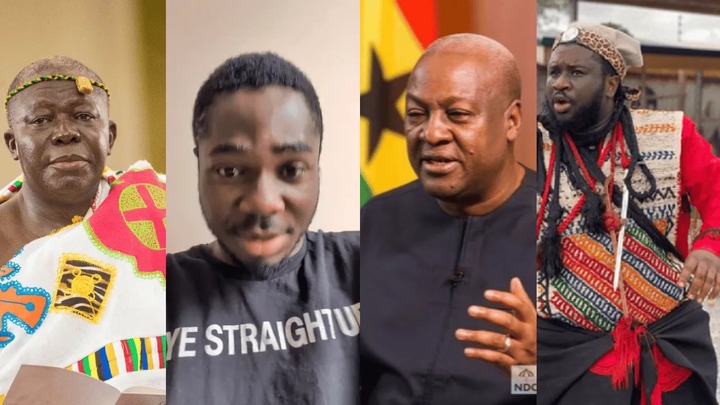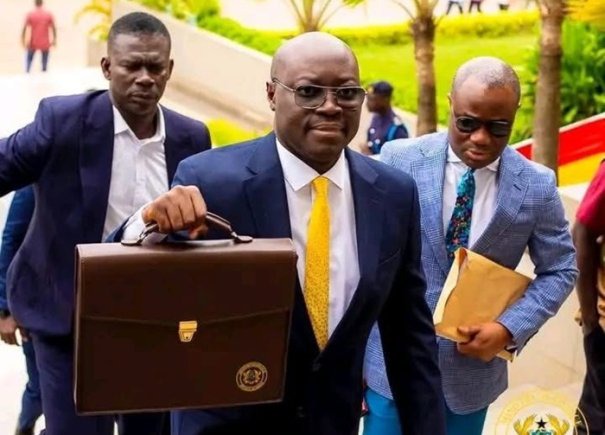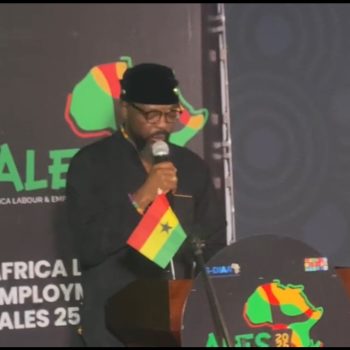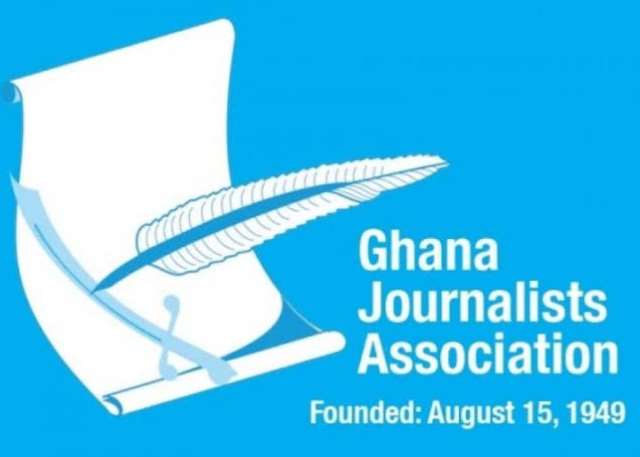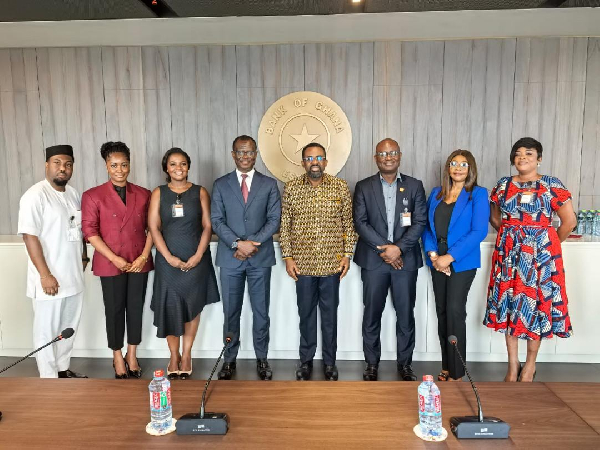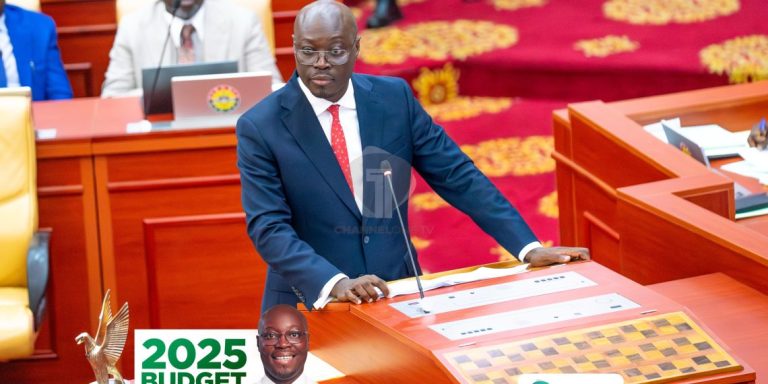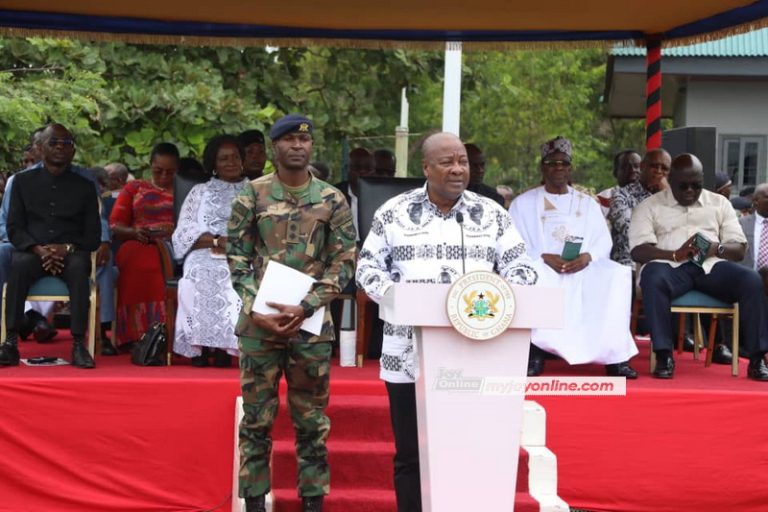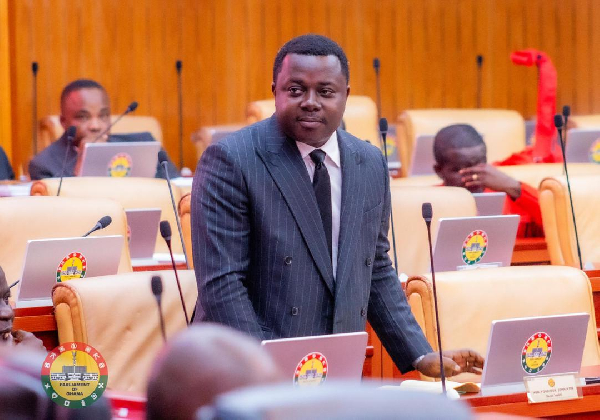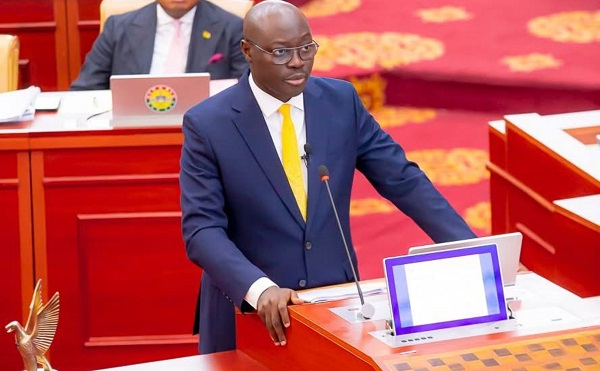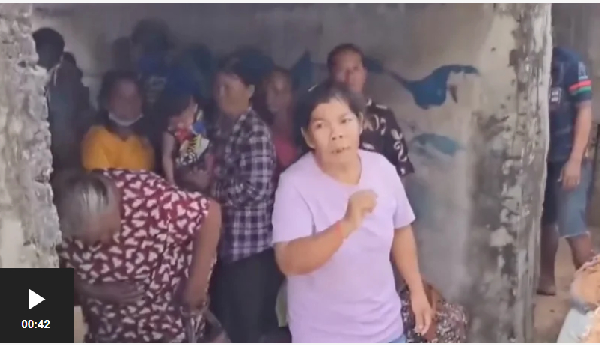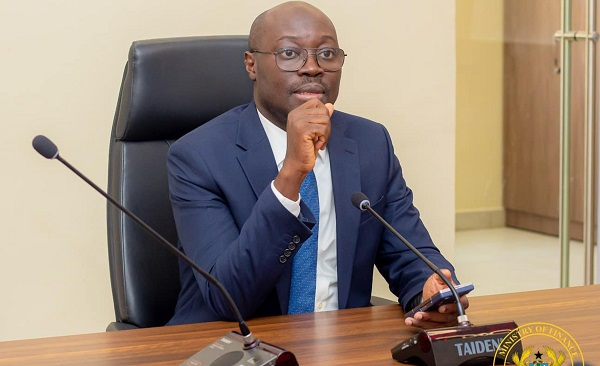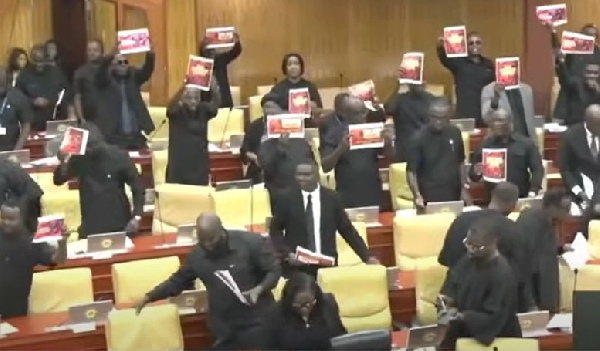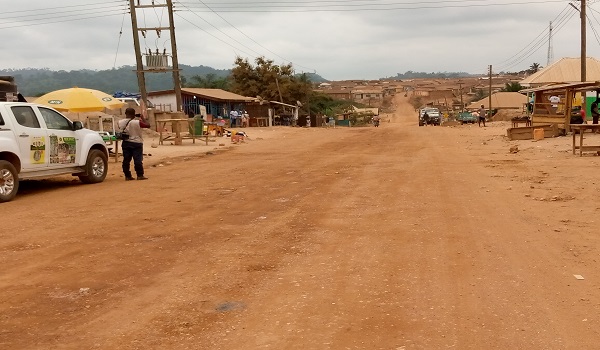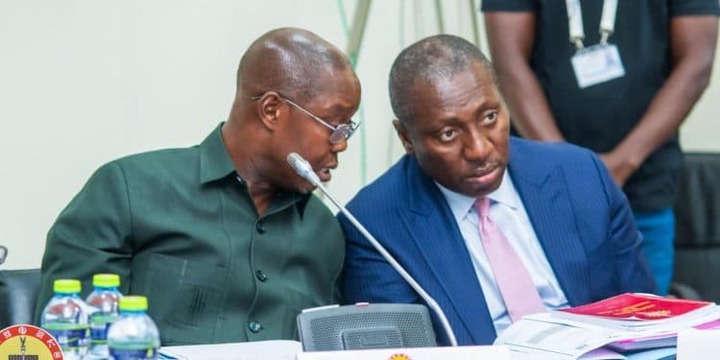Highly opinionated Ghanaian social media commentator, Young Don, has officially apologised to spiritual leader Bishop Kwabena Boakye Asiamah, popularly known as Ajagurajah, following a long-standing public feud.
In a recent turn of events, Young Don, who claims to have suffered a life-changing accident, personally reached out to Bishop Ajagurajah via phone to render a heartfelt apology for his past actions, particularly the derogatory remarks he made about the spiritual leader and his mother.
Young Don’s past
Here’s the phone conversation between Young Don and Ajagurajah
Africa CDC Launches Digital Health Knowledge Portal
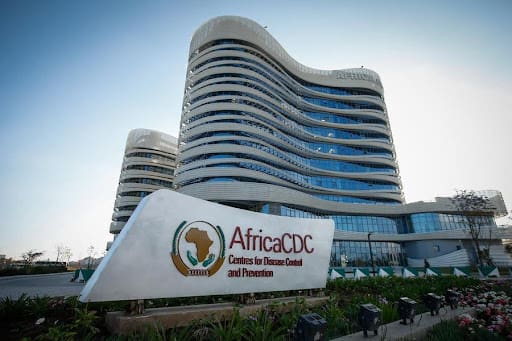

The Africa Centres for Disease Control and Prevention (Africa CDC) has developed a new digital platform designed to centralize public health information and enhance disease response capabilities across the continent.
Dubbed the Africa Health Knowledge Management Portal, the system aims to improve access to critical health data, documents, and policy insights for African Union member states.
According to Africa CDC officials, the portal will operate across continental, regional, and national levels, with pilot programs already initiated in selected countries. It is intended to function as a comprehensive hub supporting timely information sharing and improved health system coordination. Officials described the platform as a “smart system” built to catalyze evidence-based decision-making and strengthen national health systems.
Key functionalities include multilingual support, advanced search capabilities, and real-time document comparison tools. The platform is designed to make public health knowledge more accessible and usable for health professionals and policymakers. Development received support from the Rockefeller Foundation and the Mastercard Foundation.
Acting Director of Science and Innovation at Africa CDC, Mosoka Papa Fallah, emphasized the portal’s role in bridging longstanding gaps in knowledge access and application. Africa CDC states the overarching goal is to ensure vital health knowledge becomes actionable, directly strengthening disease prevention efforts, outbreak response coordination, and overall health system resilience continent-wide.
The initiative represents a significant step towards facilitating regional knowledge exchange and empowering evidence-based public health strategies across Africa. Officials anticipate it will significantly improve how member states access and utilize critical health intelligence.
Third term calls for Mahama are dangerously divisive – Nyaho-Tamakloe to Clergy
Statesman and founding member of the New Patriotic Party (NPP), Dr. Nyaho Nyaho-Tamakloe, has warned religious leaders, particularly within the charismatic movement, to refrain from making unconstitutional declarations regarding Ghana’s presidency.
In a statement titled “Religious Leaders Must Stay Within Their Lane—Leave Constitutional Matters Alone,” sighted by Citi News on Thursday July 24, he expressed deep concern over recent suggestions from some religious figures that President John Dramani Mahama should seek a third term, allegedly based on prophetic visions.
“Let me state clearly and unequivocally: this must not happen, and it will not happen,” Dr Nyaho-Tamakloe declared.
He emphasised that such pronouncements are not only unconstitutional but also dangerously divisive.
Ghana’s 1992 Constitution limits a president to two terms — a clause that is entrenched and can only be amended through a national referendum. “Not dreams, visions, or prophetic declarations,” he stressed.
Dr. Nyaho-Tamakloe warned that Ghana’s democracy must not be derailed by “pulpit proclamations,” urging pastors and prophets to refrain from interfering in governance and constitutional issues. He drew historical parallels with the late 1970s when religious influence played a role in political instability during the regime of General I.K. Acheampong, leading to a series of military interventions and ultimately, the 1979 revolution.
He cautioned that such spiritual overreach nearly collapsed the nation once and should never be repeated.
“Ghanaians are looking for serious leadership… not theatrical spirituality that distorts truth and sows confusion,” he said.
He further advised President Mahama to uphold his constitutional limits and avoid being drawn into any attempt to alter term limits, emphasising that the former president should be allowed to protect his legacy and serve the nation in other capacities.
The veteran politician concluded with a firm call to both clergy and citizens: “Ghana’s peace and democratic stability must never be sacrificed for personal ambition or populist spirituality. Enough is enough. Ghana deserves better.”
Read the full statement by Dr Nyaho Nyaho-Tamakloe here
Read also
GJA orders rerun of Ashanti Region Chairperson elections
‘Mum And Dad’ – Priscilla Ojo, Juma Jux Announce Pregnancy With Baby Bump Photos
Newly married celebrity couple, Priscilla Ojo-Mkambala and Tanzanian singer Juma Jux, are expecting their first child together.
Naija News reports that the couple shared the news with fans in an Instagram post on Thursday night that showed Priscilla proudly displaying her baby bump with the scan result.
See photos below:
Priscilla and Juma got married in April 2025 in a lavish ceremony attended by family, friends, and celebrities from both Nigeria and Tanzania.
We’ve learned lessons from NPP’s punishment at the polls—Ablakwa on gov’t fiscal responsibility
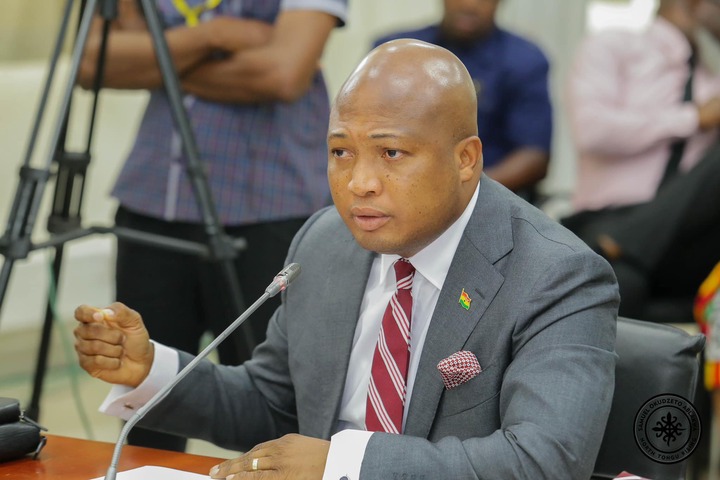
The Member of Parliament for North Tongu, Samuel Okudzeto Ablakwa, has condemned the Nana Addo Dankwa Akufo-Addo-led government.
He says they run the country like a Ponzi scheme to enrich themselves while the welfare of the Ghanaian people kept deteriorating.
Samuel Okudzeto Ablakwa was speaking to the media after the finance minister presented the mid-year review in parliament on July 24, 2025.
Pure FM Kumasi gutted by fire; programming suspended

Popular Kumasi radio station Pure FM (95.7 MHz) has temporarily gone off the air after a late-night fire damaged its studios and destroyed all broadcast equipment.
The fire began during a live show on wednesday evening and raged for more than three hours before firefighters brought it under control.
Although eyewitnesses say an electrical fault may have triggered the fire, the Ghana National Fire Service is expected to carry out a full investigation to determine the exact cause of the blaze.
Though the building structure remained, all studio equipment was destroyed. No injuries were reported.
Pure FM is part of the Angel Broadcasting Network (ABN), known for its strong local programming, especially in the Ashanti Region.
In a statement shared on social media, popular broadcaster Kwame Adinkrah expressed his exhaustion after hours of trying to control the fire with his colleagues.
“We’ve just spent over three intense hours battling the fire that broke out at Pure FM studios. Thankfully, we managed to save the building, but we lost all our studio equipment. We’ll be off air temporarily, but we shall rise again!.”
By Jacob Aggrey
Kwaku Dawuro presents The Movement in the Morning Political Show
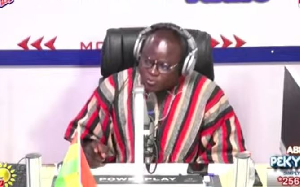 Kwaku Dawuro presents the morning political show on Movement TV
Kwaku Dawuro presents the morning political show on Movement TV
Kwaku Dawuro presents The Morning Political Show on the Wontumi morning show.
Seated with his guests, they discussed some of the most topical political subjects of the week.
Together with his guests, they provided in-depth analysis of political stories making headlines today.
With its blend of expert analysis and engaging discussions, the programme, hosted in the widely spoken local dialect, Twi, brings together well-experienced guests and professionals to share their perspectives on the nation’s most pertinent political and social matters.
Watch the Livestream below:
France will recognise Palestinian state, Macron says
France will officially recognise a Palestinian state in September, President Emmanuel Macron has said.
In a post on X, Macron said the formal announcement would be made at a session of the UN General Assembly in New York.
“The urgent need today is for the war in Gaza to end and for the civilian population to be rescued. Peace is possible. We need an immediate ceasefire, the release of all hostages, and massive humanitarian aid to the people of Gaza,” he wrote.
Palestinian officials welcomed Macron’s move, while Israeli Defence Minister Israel Katz described it as a “disgrace and a capitulation to terrorism”.
In his Thursday’s post on X, Macron wrote: “True to its historic commitment to a just and lasting peace in the Middle East, I have decided that France will recognise the State of Palestine.
“We must also guarantee the demilitarisation of Hamas, and secure and rebuild Gaza.
“Finally, we must build the State of Palestine, ensure its viability, and ensure that by accepting its demilitarisation and fully recognising Israel, it contributes to the security of all in the Middle East. There is no alternative.”
Macron also attached a letter to Palestinian Authority President Mahmoud Abbas confirming his decision.
Reacting to Macron’s announcement, Abbas’ deputy Hussein al-Sheikh said “this position reflects France’s commitment to international law and its support for the Palestinian people’s rights to self-determination and the establishment of our independent state”, according to the AFP news agency.
Meanwhile, Katz condemned the French decision, saying it was a “reward and a back-up for the Hamas murderers and abettors, who committed the worst massacre of the Jewish people since the Holocaust”.
Currently, the State of Palestine is recognised by more than 140 of the 193 member states of the UN.
A few European Union countries, including Spain, are among them.
But Israel’s main supporter, the US, and its allies including the UK have not recognised a Palestinian state.
Israel argues that recognition of an independent Palestinian state in the wake of Hamas’s 7 October 2023 in Israel “rewards terrorism”.
The Israeli military launched a campaign in Gaza in response to the attack on southern Israel, in which about 1,200 people were killed and 251 others were taken hostage.
At least 59,106 people have been killed in Gaza since then, according to the territory’s health ministry.
Much of Gaza has been reduced to rubble since then.
Earlier on Thursday, the UN’s Palestinian refugee agency (Unrwa) said that one in five children in Gaza City was now malnourished and cases were increasing every day.
More than 100 international aid organisations and human rights groups have also warned of mass starvation in the Gaza Strip – pressing for governments to take action.
Israel, which controls the entry of all supplies into the Palestinian territory, has repeatedly said that there is no siege, blaming Hamas for any cases of malnutrition.
In a statement, UK Prime Minister Sir Keir Starmer condemned the “unspeakable and indefensible” humanitarian conditions in Gaza.
He said the situation had been “grave for some time” but it has “reached new depths”.
“We are witnessing a humanitarian catastrophe,” Sir Keir added.
DISCLAIMER: The Views, Comments, Opinions, Contributions and Statements made by Readers and Contributors on this platform do not necessarily represent the views or policy of Multimedia Group Limited.
DISCLAIMER: The Views, Comments, Opinions, Contributions and Statements made by Readers and Contributors on this platform do not necessarily represent the views or policy of Multimedia Group Limited.
Over 53,000 ‘ghost names’ discovered on government payroll – Finance Minister
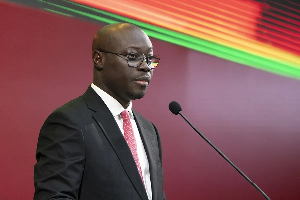 Dr Cassiel Ato Forson is the Minister of Finance
Dr Cassiel Ato Forson is the Minister of Finance
The Minister of Finance has disclosed that an ongoing audit by the Audit Service has led to the discovery of more than 53,000 workers who are designated, resigned or retired on the government’s payroll.
According to Dr Cassiel Ato Forson, the audit also found over 14,000 workers whose credentials could not be verified.
Dr Forson, who made these remarks during his presentation of the 2025 Mid-Year Budget Review on July 24, 2025, indicated that a recovery of unearned salary from these persons is estimated to be over GH¢150 million.
“Mr. Speaker, the Ghana Audit Service has completed 91% of the payroll audit. 173. So far, the Audit Service has not been able to identify and verify over 14,000 workers. Again, they have identified 53,311 separated staff – staff who are either on retirement, resigned, terminated, leave without pay or deceased, and yet remain on government payroll,” he said.
He added, “The Audit Service expects to recover GH¢150.4 million of unearned salaries from the separated staff over the 2023 and 2024 period.”
The minister indicated that to eliminate these “ghost names” from the payroll, the government would start sanctioning all the people who are responsible for validating their salaries.
BAI/AE
Meanwhile, you can also watch videos from the NPP’s National Delegates Conference below:
Watch the latest episode of Health Focus below:
LIVESTREAMED: Minister of Finance presents 2025 Mid-Year Budget Review in Parliament
<!– –>
<!–
(function(w, d) {
var s = d.createElement(‘script’);
s.src=”//cdn.adpushup.com/45999/adpushup.js”;
s.crossOrigin=’anonymous’;
s.type=”text/javascript”; s.async = true;
(d.getElementsByTagName(‘head’)[0] || d.getElementsByTagName(‘body’)[0]).appendChild(s);
w.adpushup = w.adpushup || {que:[]};
})(window, document);
–>


Kuami Eugene is struggling to get a hit song because I left him- Mary Rockstar
Mary Rockstar, the former housekeeper of Kuami Eugene has made it into the trends again with another bombshell.
Mary granted an interview recently and as usual, chose violence over peace even though she was not forced.
Speaking during the interview, Mary Rockstar stated that following their separation Kuami Eugene is unable to provide another hit song.
According to her, the “Angela” hitmaker is currently struggling to make a hit song even though he is trying his best.
The former houself bragged that, she
Diaspora office, ‘Back to your roots’ to sign MoU for impactful projects
The Office of Diaspora Affairs at the Presidency has announced plans to discuss and sign a Memorandum of Understanding (MoU) with a group named “Back to your roots” to streamline impactful projects by Ghanaians living abroad or those with Ghanaian roots.
This follows calls from foreign individuals of Ghanaian descent urging the Office of Diaspora Affairs to implement measures facilitating their involvement in impactful projects in Ghana.
Speaking to Channel One News after engaging with the diaspora team, on July 24, Kofi Okyere Darko (KOD), Director of Diaspora Affairs at the Presidency, assured that the office will collaborate with all stakeholders to ensure individuals of Ghanaian descent living abroad have straightforward access to undertake projects in Ghana.
He commended the European Union (EU) and the German Agency for International Cooperation (GIZ) for their collaborative efforts with international partners, describing the initiative as a significant step towards ensuring Ghanaians in Europe feel connected and contribute effectively to Ghana’s socio-economic development.
“The remittances from these individuals play a vital role in our growth,” KOD noted.
“We cannot focus on one part of the world and neglect others. Our mandate includes replicating such initiatives to ensure they are sustainable and not merely a one-off.”
KOD also highlighted the importance of engaging second- and third-generation Ghanaians in the diaspora to maintain their interest in Ghana.
“We are keen to work with young people and organisations like Forum to move things forward,” he added, expressing enthusiasm for the MoU and its potential to foster long-term collaboration.
Meanwhile, project manager for the Roots to Ghana programme, Milli Antwi, emphasised the emotional and practical significance of the initiative.
“It’s important because we are the children of Ghana,” Antwi said. “Many of us were born in Europe, grew up in Europe, and were educated there, but we want to reconnect with our motherland. We love Ghana, even if our knowledge of it is limited.
“Our parents taught us languages like Twi, which we speak with our accents. Now, with our education and financial stability, we want to give back by investing in properties, creating businesses, and joining companies to help them grow with our expertise.”
Antwi added that the partnership will foster impactful projects in Ghana, further strengthening ties with the diaspora.
“This initiative, supported by the EU and GIZ, will significantly contribute to our socio-economic growth,” she concluded.
…..
Explore the world of impactful news with CitiNewsroom on WhatsApp!
Click on the link to join the Citi Newsroom channel for curated, meaningful stories tailored just for YOU:
https://whatsapp.com/channel/0029VaCYzPRAYlUPudDDe53x
No spam, just the stories that truly matter! #StayInformed #CitiNewsroom #CNRDigital
Ghana has sufficient aviation fuel – NPA assures public
The National Petroleum Authority (NPA) has also dispelled rumours of an aviation fuel shortage, stating emphatically that there is sufficient Aviation Turbine Kerosene (ATK) in Ghana to meet current demand.
This comes after the Energy and Green Transition Ministry denied recent media reports suggesting a shortage of ATK fuel in the country, assuring the public and the aviation sector that there is sufficient supply to support all aircraft operations.
In a press release, the Ministry described the reports as false and misleading, stating that Ghana currently has adequate reserves of ATK fuel.
Similarly in a statement issued on Thursday, July 24, 2025, the NPA confirmed that engineers from Ghana Petroleum Mooring Systems (GPMS) have completed the round-the-clock replacement of 600 meters of pipelines critical for ATK discharge operations.
According to the NPA, a vessel carrying 10,000 metric tonnes of ATK is currently discharging into three major national depots:
6,000MT to the Tema Oil Refinery (TOR)
1,500MT to Ridge Depot
2,500MT to PWSL
“This supply is sufficient to last for the next two weeks,” the NPA noted, adding that two additional vessels are currently at anchorage and ready to discharge according to schedule.
In addition, tankers are actively loading at the Sahara Depot for delivery to the airport, reaffirming that the supply chain is intact and resilient.
The Authority urged the media and general public to disregard any reports of ATK shortages, emphasising its ongoing collaboration with stakeholders to maintain energy security across the aviation sector.
The NPA also extended its gratitude to the GPMS engineers for their dedication and round-the-clock efforts in resolving pipeline infrastructure issues that had previously hampered fuel distribution.
Over 14,000 Ghost Names Found on Gov’t Payroll — Finance Minister Warns Offenders
A nationwide audit of the public payroll has uncovered more than 14000 unverified names sparking fears of widespread fraud and financial loss
Finance Minister Dr Cassiel Ato Forson presenting the 2025 Mid-Year Budget Review in Parliament on Thursday revealed that the Ghana Audit Service after covering 91 percent of the public sector payroll could not verify over 14000 individuals currently drawing salaries
He added that 53311 names of separated staff including retirees deceased persons and reassigned employees
Community members urged to engage quality electricians
By Charles Tawiah
Nkawie (Ash) July 24, GNA – Mr. Abubakar Sedik, District Chief Executive (DCE) for Ahafo Ano South-West in the Ashanti Region, has appealed to community members to always engage qualified electricians to work on their electrical problems.
This, he said would help prevent fire disasters resulting from electricity in their homes, shops and work places to help protect life and property in their communities.
Mr Sedik was speaking at the commissioning of electricity projects at separate ceremonies at “Ohia Nhye Da”, Mmrobem and Barniekrom-Nyamebekyere in the district.
The communities were hooked onto the national electricity grid under the Rural Electrification Project of the Ministry of Energy.
Mr. Sedik said it was the vision of the government to provide electricity to all communities to help boost social and economic activities.
It was therefore important for community members to ensure that electricity was used appropriately to prevent fire hazards in communities.
“Let us deal with the right people at the right time in order not to create extra difficulties to our existing problems,” he added.
The community members commended both the past and present governments for commencing and completing the projects for them after being in darkness for many years.
GNA
Edited by Kwabia Owusu-Mensah/Lydia Kukua Asamoah
Okyeame Kwame urges policy review to fight Hepatitis
Ghanaian musician, Okyeame Kwame, has called for a comprehensive review of Ghana’s Hepatitis policy and the development of a long-term public education strategy to tackle the disease more effectively.
Speaking on Channel One TV’s Breakfast Daily, he emphasised that Ghana’s current approach to Hepatitis control is inadequate and overly reliant on short-term campaigns tied to World Hepatitis Day.
He described this as a “fire service” approach that fails to sustain awareness and drive meaningful change throughout the year.
Okyeame Kwame argued that the country’s Hepatitis policy, developed over six years ago, is outdated and no longer meets the demands of the current public health landscape.
He called for a new policy document that reflects recent data, prioritises year-round interventions, and strengthens collaboration with media and other stakeholders.
“To help the WHO communicate Hepatitis conversation properly, we need the media, and we do not have to use this same ‘fire service’ strategy where it once the happens in July, we all come and quench it and go back to our businesses.
“So we need a year-long rollout plan. The Hepatitis policy that we have in Ghana is also about six years ago, I think it is getting old. We need to revamp it. We need a new policy document. We need the government to show a bit more interest. But I think that currently what we need is to forge a bit more media partners,” he stated.
As part of his ongoing efforts to raise awareness and support testing and prevention, Okyeame Kwame is funding a Hepatitis B screening and vaccination exercise scheduled for July 25 at Kasoa Old Station.
He has been at the forefront of Hepatitis advocacy in Ghana, using his platform to push for improved education, testing, and access to treatment, while urging government and civil society to treat the issue as a long-term public health priority.
Govt clears Capitation Grant arrears for Basic Schools from 2023
Full Text: 2025 Mid-Year Budget Statement
Finance Minister Dr. Cassiel Ato Forson on Thursday, July 24, 2025, presented the 2025 Mid-Year Budget to Parliament.
In his address, he outlined key measures aimed at improving the economy and highlighted major road projects the government plans to undertake.
He also provided a detailed breakdown of government payments made over the past six months.
Dr. Ato Forson further urged Ghanaians to have confidence in the national currency, the cedi, describing it as a symbol of the country’s sovereignty and economic independence.
Read the statement below by the Finance Minister
2025 MID-YEAR FISCAL POLICY REVIEW
Mid-Year Fiscal Policy Review of the 2025 Budget Statement and Economic Policy of the Government of Ghana Presented to Parliament by DR. CASSIEL ATO FORSON (MP) MINISTER FOR FINANCE on Thursday July 24, 2025 On the Authority of HIS EXCELLENCY JOHN DRAMANI MAHAMA PRESIDENT OF THE REPUBLIC OF GHANA
THEME: Resetting The Economy For The Ghana We Want
In accordance with Section 28 of the Public Financial Management Act, 2016 (Act 921)
1. Rt. Hon. Speaker, I am back to the House today with a deep sense of duty and optimism to present the Mid-Year Fiscal Policy Review of the 2025 Budget Statement and Economic Policy of government, on behalf of His Excellency President John Dramani Mahama.
2. This presentation is in line with Section 28 of the Public Financial Management Act, 2016 (Act 921).
3. Mr. Speaker, I respectfully request that the entire Mid-Year Fiscal Policy Review be captured in the Hansard while I present the highlights.
4. Mr. Speaker, before I proceed with the Mid-year review, I will like to pay tribute to former President Professor John Evans Atta Mills, whose unfortunate demise occurred on this very day 13 years ago.
5. This review is more than a fiscal update. It is an account of what we inherited and the positive results of our stewardship in the last 198 days.
6. Mr. Speaker, following his re-election with an overwhelming mandate, President John Dramani Mahama inherited an economy in deep distress, far worse than we had imagined.
7. The economy was marked by large fiscal imbalances, with huge Ministries Departments and Agencies (MDAs) arrears, massive debts, weakened institutions and heightened public anxiety.
8. Since 2023, the debts in the cocoa and energy sectors have in particular posed significant fiscal risk to the Ghanaian economy.
9. The Ghanaian private sector and the business community looked on in despair.
10. Public trust was completely eroded, the national spirit was broken and the foundations of our economy had sunk, even deeper.
11. The budget deficit had ballooned because of reckless commitments and wasteful spending.
12. The indebtedness of the government had culminated into state insolvency.
13. The impaired balance sheets paralyzed almost every single state-owned enterprise.
14. High cost of living and inflation impoverished large segments of the population, eroding the real value of incomes and savings.
15. Mr. Speaker, the mismanagement of our public finances by the previous administration led to devastating haircuts through the Domestic Debt Exchange Programme (DDEP) which denied pensioners and the middle-class their life time savings, livelihoods and dignity.
16. Eurobond holders also suffered painful haircuts severely affecting Ghanaian individuals and financial institutions.
17. Soaring interest payments crowded out essential spending on education, health and infrastructure.
18. The Ghana Cedi depreciated against all major currencies to levels never seen before, making it the worst-performing currency in the world.
19. Public sector corruption reached an all-time peak and as President Mahama said, the whole of Ghana was a crime scene.
20. Investor confidence waned considerably, significantly reducing investment inflows.
21. Public debt reached unsustainable levels.
22. The unemployment situation worsened which made it difficult for Ghanaian to find decent jobs.
23. Many Micro, Small and Medium Enterprises (MSMEs) collapsed under the weight of the economic mismanagement.
24. To compound all these, the country suffered credit rating downgrades by all 3 major credit rating agencies, placing Ghana firmly in default, junk territory never seen in the history of Ghana.
25. Mr. Speaker, to further illustrate the enormity of the economic burden, we inherited:
i. an IMF programme which had derailed and completely gone off-track, with key targets missed, putting our economic recovery programme in jeopardy.
In the words of the Deputy Managing Director of the IMF, Mr. Bo Li, “the programme had deviated substantially from its targets by the close of 2024”;
ii. weak commitment control systems and irresponsible spending left arrears of about GH¢67 billion and contract commitments of over GH¢194 billion;
iii. a bleeding energy sector with annual financing shortfalls in excess US$1.5 billion;
iv. a debt-ridden cocoa sector with liabilities of GH¢32 billion;
v. a weak financial sector with significant non performing loans (NPLs) despite pumping over GH¢30 billion into a so-called financial sector clean-up;
vi. steep debt repayment humps in 2026 (GH¢20 billion), 2027 (GH¢50.3 billion) and 2028 (GH¢45.8 billion), as well as significant short-term treasury bill maturities of GH¢137 billion;
vii, depleted buffers needed to cushion us against fiscal and external shocks with empty Sinking Fund; and
viii. stalled projects, about 55 of them tied to bilateral debt restructuring with about US$3 billion in undisbursed loans.
26. Mr. Speaker, the root of our 2022 economic crisis can be traced directly to an overbearing fiscal dominance marked by reckless spending and corruption, compounded by poor
leadership of the previous administration.
27. The worsened fiscal situation spilled over into the monetary and external sectors causing a rapid depreciation of the Ghana Cedi.
28. Monetary financing by the Bank of Ghana reached an all-time high, driving inflation to levels never seen in decades.
29. There was a complete lack of coordination between the Ministry of Finance and the Bank of Ghana signaling the highest levels of incompetence in the management of the economy.
30. Mr. Speaker, in the face of this dire inheritance bequeathed by the Akufo-Addo/Bawumia administration, the government of President John Dramani Mahama made a conscious decision not to make excuses, but to reset the country.
31. We chose the path of structural reforms and transformation. We set out to reset the economy, restore good governance and policy credibility.
32. We renewed our social contract with the Ghanaian people and redefined national priorities by being deliberate in both our policy choices and approach to economic
management.
33. At the very onset we organized a National Economic Dialogue and a National Education Forum.
34. We held direct engagements with key groups and stakeholders including market women, trade unions, youth organizations and traditional leaders.
35. Mr. Speaker, you may recall that clear policy measures were outlined in the 2025 budget presented to this House in March this year.
36. In our new economic management model, we tightened fiscal discipline without compromising social investments.
37. Mr. Speaker, the recent IMF Executive Board affirmed this new economic management model, noting that, “faced with large policy slippages and reform delays at end 2024, the new administration has taken bold corrective actions to maintain the program on track”.
38. The IMF further noted that these corrective actions, combined with continued structural reforms and an improved external sector, are expected to result in economic stability, resilience and inclusive growth.
39. We streamlined and increased investment in education, health, agriculture, infrastructure and employment.
40. In fulfilment of a major manifesto pledge, we established the Ghana Gold Board, through Act 1140, to accumulate foreign exchange to support the stability of the Ghana cedi.
41. We have restored coordination between the Ministry of Finance and the Bank of Ghana to ensure a cohesive and integrated approach to economic policymaking across all relevant institutions.
42. Mr. Speaker, in less than 200 days we have brought back clarity, certainty, stability and purpose to our economic policy direction.
43. We have made significant progress. The signs of recovery are obvious, evident, noticeable, visible, tangible and being felt.
44. Mr. Speaker:
i. Ghana’s fiscal position has significantly improved. The primary balance on commitment basis posted a surplus of 1.1% of GDP at the end of June 2025, beating the ambitious 0.4% surplus target;
ii. overall fiscal deficit on commitment basis was 0.7% of GDP, outperforming the target of 1.8% at the end of June 2025;
iii. inflation has reduced significantly from 23.8% at the end of December 2024 to 13.7% at the end June 2025.
This is the lowest since December 2021 and marks six months of continuous decline; interest rates are declining with a drastic drop in treasury bill rates.
• The 91-day T-bill rate has reduced from 27.73% in December 2024 to 14.73% in June 2025, a decline of over 1300 basis points.
• The 182-day T-bill rate has reduced from 28.43% in December 2024 to 15.34% in June 2025, a decline of over 1300 basis points.
• The 364-day T-bill rate has reduced from 29.95% in December 2024 to 15.76% in June 2025, a decline of over 1400 basis points.
v. Gross International Reserves has significantly improved. The Bank of Ghana accumulated US$11.12 billion covering 4.8 months of imports as at the end of June 2025 compared to US$8.98 billion, covering 4 months of imports as at end-December 2024.
vi.Mr. Speaker, the Ghana Cedi has demonstrated exceptional resilience and strength in recent months.
vii. As at the end of June 2025, the Cedi appreciated by 42.6% against the US Dollar, 30.3% against the British
Pound, and 25.6% against the Euro.
viii. This is a significant reversal compared to same period in 2024 when the Cedi depreciated by 18.6%, 17.9%, and 16.0%, respectively.
ix. Mr. Speaker, so far, we have almost reversed all the Cedi depreciation in 2022, 2023 and 2024.
x. Mr. Speaker, it is the first time that this level appreciation has been recorded in the 60-year history of the Ghana Cedi.
xi. Rating agencies, which once classified our sovereign reditworthiness as junk, are beginning to upgrade our ratings.
xii. Fitch Ratings upgraded Ghana’s Long-Term Foreign Currency Issuer Default Rating (IDR) to ‘B-‘ with a stable outlook from ‘Restricted Default’ (RD) on 17th June 2025.
xiii. the IMF programme is back on track with the successful conclusion of the fourth review by the IMF Executive Board on 7th of July 2025, which immediately triggered a disbursement of US$367 million.
45. Rt. Hon. Speaker, beyond the numbers, this is a story of sound leadership, better economic management and a restoration of hope to a nation once in despair.
46. Let me, on behalf of President John Mahama, sincerely thank the people of Ghana for their trust, patience and continued support.
47. We do not take your sacrifices for granted.
48. Rt. Hon. Speaker, this government did not come to simplymanage the decline. We came to reverse it and reset our country.
49. The gains of these first six months are just the beginning.
50. Mr. Speaker, these early successes only encourage us to stay the course, stay disciplined and continue to do more for the people of Ghana.
51. There is still a long road ahead. But our steps are now steadier, our direction clearer and the national spirit has been lifted with the gradual restoration of hope in our democracy.
52. We have moved from promises to purpose, from ineptitude to action and from distress to relief.
53. We have established policy credibility and restored creditworthiness.
54. Mr. Speaker, the rest of my presentation will provide updates on the following:
i. macroeconomic performance for the first six months of 2025;
ii.progress on the implementation of the IMF Programme;
iii. the status of Ghana’s debt restructuring programme; and the status of implementation of key Government programmes.
MACROECONOMIC PERFORMANCE FOR JANUARY-JUNE 2025
55. Mr. Speaker, the first half of 2025 has demonstrated our government’s commitment to economic recovery.
56. Through prudent fiscal management, sound monetary policy, effective structural reforms and strategic investments, we are laying a solid foundation for sustainable growth and shared prosperity.
57. To put the assessment of the economy in the first half of 2025 in a proper perspective, it will be useful to restate the ambitious, yet attainable, macroeconomic targets we set
for ourselves:
• Overall Real GDP growth of at least 4.0%;
• Non-Oil Real GDP growth of at least 4.8%;
• End-year inflation rate of 11.9%;
• Primary balance on commitment basis at a surplus of 1.5% of GDP; and
• Gross International Reserves covering not less than three months of imports.
REAL SECTOR PERFORMANCE
58. Mr. Speaker, despite global economic uncertainties, Ghana’s economy demonstrated robust growth.
59. In the first quarter of 2025, the economy expanded by 5.3%, up from 4.9% in the same period of 2024, marking the highest first quarter growth since 2020.
60. The agriculture sector led this growth with a remarkable 6.6% increase, about three times the growth in first quarter of 2024.
61. The agriculture sector growth contributed 26.4% of the overall first quarter growth. The fishing sub-sector grew
the most at 16.4%.
62. The services sector, constituting the largest share of the economy at 46.8%, grew by 5.9% and contributed 47.9% to the overall first quarter growth, with Information and Communication Technology (ICT) leading the growth in the sector at 13.1%.
63. Industry grew by 3.4% in the first quarter of 2025, contributing 20.6% to the overall first quarter growth. Manufacturing also posted an impressive growth of 6.6%.
64. Mr. Speaker, non-oil GDP growth also picked up strongly, growing at 6.8% in the first quarter of 2025 compared to the growth rate of 4.3% in the same period in 2024.
65. The non-oil GDP growth is the highest since 2018.
66. It is expected that with the introduction of the 24-Hour Economy Policy, the Big Push Programme and the Agriculture for Economic Transformation Programme, the GDP growth will be sustained and possibly exceed the targeted rate of 4% for 2025.
PRICE DEVELOPMENTS
67. Mr. Speaker, we pledged to pursue the following to reduce
inflation:
i. implement aggressive fiscal consolidation drive aimed at reducing the fiscal deficit and borrowing;
ii. stabilize the exchange rate to reduce inflation on items that rely on the exchange rate for pricing such as fuel, transportation, imported sugar, rice and cooking oil;
iii. implement policies that target items with large weights in the CPI basket such as transportation and utilities to reduce their prices;
iv. BoG to implement an appropriate monetary policy stance and use its liquidity management interventions to support the disinflation process; and
v. implement the Agriculture for Economic Transformation Agenda to reduce food inflation.
68. Rt. Hon. Speaker, it is instructive to note that these intentional policies announced in the 2025 Budget to tame inflation are yielding massive results.
69. Inflationary pressures have eased significantly. The drastic fall in inflation is not by chance or sheer luck but as a result hard work and deliberate policies.
70. Consumer price inflation has reduced from 23.8% in December 2024 to 13.7% in June 2025. This represents a massive 10.1 percentage points decline.
71. Similarly, producer price inflation saw a sharp decline from 26.1% in December 2024 to 5.9% in June 2025, representing a steep decline of 20.2 percentage points in six months.
72. Food inflation declined from 27.8% in December 2024 to 16.3 percent in June 2025, representing an encouraging 11.5 percentage points reduction.
73. Non-Food inflation also declined from 20.3% in December 2024 to 11.4% in June 2025, representing 8.9 percentage points reduction.
74. Inflation for locally produced goods and services declined from 26.4% in December 2024 to 14% in June 2025.
75. Inflation for imported items decreased from 18.0% in December 2024 to 12.5% in June 2025.
76. These improvements are reflective of the effective fiscal consolidation, tight monetary policy, strong central bank reserves and the appreciation of the cedi.
77. Mr. Speaker, with this trend, we are focused and determined to achieve our end-December 2025 inflation target of 11.9% ahead of schedule.
78. Mr. Speaker, let me assure this House and the people of Ghana that things can only get better in the coming days.
INTEREST RATE MOVEMENTS
79. Interest rates have declined, reflecting improved macroeconomic conditions.
80. The 91-day treasury bill rate reduced by 13 percentage points from 27.7% in December 2024 to 14.7% in June 2025.
81. Similar trends were observed in the 182-day and 364-day bills.
82. The 182-day treasury bill rate decreased by 13.1 percentage points from 28.43% in December 2024 to 15.34% in June 2025.
83. The 364-day treasury bill rate declined by 14.19 percentage points from 29.95% in December 2024 to 15.76% in June 2025.
84. The average lending rate decreased from 30.3% in December 2024 to 27.0% in June 2025.
85. The Ghana Reference Rate fell from 29.31% in December 2024 to 24.0% in June 2025.
86. Rt. Hon. Speaker, we have saved GH¢4.9 billion on domestic interest payment as at end June 2025 due to our prudent debt management policies.
FISCAL PERFORMANCE
87. Mr. Speaker, our fiscal discipline has yielded remarkable results so far.
88. We have delivered below-target deficits on both cash and commitment basis.
89. We have delivered a greater-than-anticipated primary surplus, the core fiscal anchor.
90. We have delivered a strong expenditure and commitment control.
91. We have delivered robust tax revenue performance.
92. Mr. Speaker, provisional data shows that the primary balance on commitment basis (the fiscal anchor) as at end of June 2025 recorded a surplus of 1.1% of GDP, surpassing
the targeted surplus of 0.4% of GDP.
93. The overall fiscal deficit on a commitment basis was a deficit of 0.7% of GDP, better than the deficit target of 1.8% of GDP.
94. Mr. Speaker, on cash basis, the overall balance recorded a deficit of 1.1% of GDP. This is significantly better than the projected deficit target of 2.4% of GDP.
95. The primary balance on cash basis turned surplus at 0.7% of GDP, against a projected deficit of 0.2% of GDP.
96. The Non-Oil Tax Revenue (net) exceeded target by about GH¢787 million.
97. Corporate Income Tax exceeded target by GH¢555.3 million, representing 2.9% above target.
98. Mineral royalties exceeded its target by GH¢143 million.
99. Import duties fell short of target by GH¢1.6 billion.
100. Expenditures were contained at GH¢109.7 billion or 7.8% of GDP. This was 14.3% below the programmed amount of GH¢128.0 billion or 9.1% of GDP, reflecting strong expenditure control.
101. Primary Expenditure or non-interest expenditures on commitment basis amounted to GH¢84.3 billion or 6.0% of GDP.
102. This is an improvement of about GH¢13.3 billion over the target of GH¢97.5 billion, which is 7.0% of GDP.
103. Mr. Speaker, Interest Payments amounted to GH¢25.4 billion, which is 1.8% of GDP.
104. This is below the target of GH¢30.5 billion, which is 2.2% of GDP. This was mainly due to lower domestic interest payments.
105. Domestic Interest payments amounted to GH¢21.6 billion, against a target of GH¢26.5 billion, representing a reduction of GH¢4.9 billion, mainly on account of lower than planned domestic borrowings and the decline in T-bill rates.
106. External Interest Payments amounted to GH¢3.8 billion, against a target of GH¢4.0 billion, due mainly to the appreciation of the Cedi.
107. Other Expenditure, mainly comprising Energy Sector Levies (ESL) transfers and Energy Sector Payment Shortfalls, amounted to GH¢11.4 billion or 0.8% of GDP.
108. This was 12.7% below the target of GH¢13.1 billion or 0.9% of GDP for the period.
109. Mr. Speaker, Arrears Clearance amounted to GH¢4.8 billion.
110. It is important to note that there was no build-up in arrears payable during the period under review, signaling strong commitment control and fiscal discipline.
111. Mr. Speaker, the fiscal balance on cash basis was a deficit of GH¢15.1 billion or 1.1% of GDP.
112. The deficit was largely financed from domestic sources with Net Domestic Financing (NDF) of GH¢13.1 billion, well below the GH¢18.7 billion target.
113. Net Foreign Financing was GH¢2.8 billion, mostly from the utilization of GH¢4.5 billion IMF loan disbursement, from the 1st to the 6th of January 2025 before the Mahama administration took office.
114. Project loan disbursements was GH¢2.4 billion.
115. Mr. Speaker, even though Ghana is relying on the domestic market for financing, we have borrowed less than we planned, signifying strong expenditure control and fiscal discipline.
116. This is a strong signal to the investor community and all other stakeholders that the needed fiscal consolidation is happening here in Ghana and will be sustained.
EXCHANGE RATE DEVELOPMENTS
117. Mr. Speaker, government committed to implement the following measures to stabilize the exchange rate:
i. establish the Ghana Gold Board to enhance the generation and accumulation of foreign exchange to support the stability of the cedi;
ii. pursue strong fiscal consolidation through the reduction in public sector spending and the fiscal deficit to reduce pressures on the exchange rate;
iii. implement appropriate FX forward auctions to support the stability of the Cedi; and
iv. implement the 24-Hour Economy and Accelerated Export Development Programme to boost local production and reduce reliance on imports.
118. Rt. Hon. Speaker, let me state emphatically that these deliberate policies announced in the 2025 Budget to stabilize the Ghana cedi are yielding massive results.
119. The results we are witnessing are not by chance. They are the fruits of hard work, discipline and intentional policies.
120. Mr. Speaker, the cedi’s performance in the first half of this year has been impressive!
121. The Ghana Cedi experienced significant appreciation against all major trading currencies in the first six months of 2025.
122. I am happy to inform the House that our precious cedi, which once upon a time was trading at about GH¢17.0 to 22 the US Dollar, was trading at about GH¢10.4 as at yesterday, 23rd July, 2025.
123. Similarly, the cedi, which was once trading at GH¢21.0 to the Great British Pound, was trading at about GH¢14.1 as at yesterday, 23rd July, 2025.
124. Mr. Speaker, as of end-June 2025, the Cedi appreciated by 42.6% against the US Dollar, 30.3% against the British Pound, and 25.6% against the Euro.
125. This is a significant improvement over the cedi’s depreciation of 18.6%, 17.9%, and 16.0% against the US Dollar, Great British Pound and Euro, respectively in the same period in 2024.
126. Mr. Speaker, I repeat, so far, we have almost reversed all the Cedi depreciation in 2022, 2023 and 2024.
127. This level of appreciation of the Ghana Cedi has never happened in the history of our nation.
128. Mr. Speaker, colleagues, Ghanafo, cedi no apicki! Apicki apicki apicki!!!
129. Mr. Speaker, these gains are largely due to strong fiscal consolidation, tight monetary policy, improved external sector balances, renewed investor confidence, positive market sentiments, credit rating upgrades and successfully securing staff level agreement and subsequent Board
approval on the 4th Review of the IMF programme.
130. The cedi’s rebound signals that Ghana’s economic foundations are once again beginning to firm up.
131. Sustaining this stability will require continued fiscal discipline, supportive monetary policy, strong liquidity sterilization, robust reserve accumulation supported by activities of the GoldBod and credible implementation of structural reforms.
EXTERNAL SECTOR PERFORMANCE
132. Mr. Speaker, our external sector has shown remarkable improvement in the last six months.
133. Gross International Reserves reached US$11.12 billion by June 2025, covering 4.8 months of imports, up from US$8.98 billion in December 2024, equivalent to 4.0 months of import cover.
134. Mr. Speaker, in just 6 months, even before the IMF and World Bank disbursements, in fact without external borrowing, we have added US$2.14 billion to the country’s Gross International Reserves.
135. The trade surplus increased from US$1.37 billion in June 2024 to US$5.57 billion in June 2025, representing 306.6% increase.
136. This was driven by strong exports, particularly in gold and cocoa, and controlled imports.
137. The current account surplus improved significantly to a provisional value of US$3.44 billion by June 2025, from US$283.11 million in June 2024.
138. Provisional net capital and financial inflows reached US$937.58 million in June 2025, indicating renewed investor confidence.
MONETARY AND FINANCIAL SECTOR DEVELOPMENTS
139. Mr. Speaker, monetary indicators point to a sustainable monetary expansion.
140. Credit to the private sector increased by about 31.3% in June 2025.
141. Reserve money growth moderated, and M2 growth remained consistent, supported by increased deposit mobilization and improved net foreign assets.
142. Net Domestic Assets growth slowed, while Net Foreign Assets surged, indicating a shift in liquidity drivers towards external inflows.
RECAPITALIZATION OF NATIONAL INVESTMENT BANK (NIB)
143. Rt. Hon. Speaker may recall that I updated this House during the 2025 Budget presentation on the restructuring and recapitalization of National Investment Bank (NIB) as one of the critical reforms in the financial sector that should have been delivered in 2024.
144. Unfortunately, after spending a whopping GH¢30.3 billion in a so-called financial sector clean-up exercise, the previous NPP administration left NIB in dire straits, with a Capital Adequacy Ratio of negative 53.13% by the end of 2024.
145. Mr. Speaker, we have successfully recapitalized the National Investment Bank (NIB) by implementing an ambitious and credible Plan to return NIB to profitability and sustainability.
146. Rt. Hon. Speaker, we have taken the following steps:
i. injected a total of GH¢450.00 million in cash; issued marketable bonds with a face value of about GH¢1.5 billion to National Investment Bank (NIB); and transferred the GH¢500 million Government of Ghana’s shares in Nestle Ghana Ltd to the National Investment Bank.
147. These transfers have significantly improved the Capital Adequacy Ratio from negative 53.13% at the end of 2024 to positive 23% in May 2025.
148. Mr. Speaker, by taking these major steps:
i. we have preserved depositor’s funds valued at GH¢6.4 billion; 26
ii. we have saved over 900 direct jobs at the National Investment Bank; and we have preserved an indigenous Ghanaian bank.
149. Mr. Speaker, unlike the previous administration, we chose to spend to save a bank than spend to collapse a bank.
150. Rt. Hon. Speaker, we have also prepared a Forward Looking Overarching Restructuring Plan for the National Investment Bank to put the bank on a sustainable path of profitability.
151. The plan also aims to enhance board independence and objectivity, strengthen risk management, promote accountability and transparency, prevent insider dominance and improve strategic decision-making.
152. Mr. Speaker, this plan will, among others:
i. strengthen corporate governance framework and systems;
ii. improve enterprise risk management and controls;
iii. establish a modern business model; revamp operational strategy;
v. improve financial performance;
vi. institute enhanced supervisory measures; and
vii. eventually list NIB on the Ghana Stock Exchange.
153. Rt. Hon. Speaker, NIB now has total Paid-Up capital of GH¢3.4 billion and a Capital Adequacy Ratio of 23%.
154. Mr. Speaker, on behalf of the President, I want to use this opportunity to assure the people of Ghana and depositors that our indigenous bank, the National Investment Bank, is now prime for business.
155. More importantly, Mr. Speaker:
i. NIB is back!
ii. NIB is now liquid!
iii. NIB is now safe!
iv. NIB is now fully capitalized!
156. We, therefore, encourage all and sundry to do business with the revitalized National Investment Bank.
CREDIT RATING UPDATES
157. Mr. Speaker, the progress we are making in our economic reforms and debt restructuring efforts has been recognized internationally.
158. On 16th June 2025, Fitch Ratings upgraded Ghana’s Long Term Foreign-Currency Issuer Default Rating to ‘B-‘ with stable outlook from ‘Restricted Default’, the first time since 2021.
159. Fitch cited significant exchange rate appreciation, declining debt levels, strong nominal GDP growth, increased reserve accumulation and normalized relations with external creditors as key drivers.
160. Mr. Speaker, to sustain these gains, we will, among other things:
i. maintain fiscal discipline through continued implementation of prudent policies to promote
fiscal and debt sustainability;
ii. continue the aggressive revenue mobilization by strengthening tax collection systems and broadening the tax base to increase domestic revenues without overburdening citizens;
iii. accelerate structural reforms in public financial management, including transparency and
accountability measures, to improve efficiency and reduce corruption;
iv. strengthen monetary policy framework by BoG to complement the fiscal consolidation programme to control inflation and support economic stability;
v. diversify the economy through investments in sectors beyond traditional exports to reduce vulnerability to commodity price shocks; and
vi. continue to maintain strong relationships with international financial institutions and development partners to support ongoing reforms and access technical assistance.
161. It is expected that the other rating agencies, namely S&P and Moody’s will follow suit given the remarkable progress we are making in ensuring economic stability and
promoting inclusive growth.
162. Mr. Speaker, this is just the beginning. We are determined to do better than the B- rating. Ghana deserves better.
UPDATE ON FISCAL POLICIES
REVENUE
VAT REFORMS
163. Mr. Speaker, in the 2025 Budget Statement, we reaffirmed our commitment to the people of Ghana and the business community to undertake comprehensive Value Added Tax
(VAT) reforms this year.
164. These reforms are aimed at addressing the distortions and cascading effects inherent in the current VAT structure.
165. To support this effort, we also committed to seeking technical assistance from the International Monetary Fund (IMF) and engage the Ghanaian people.
166. Mr. Speaker, I am pleased to report that we have successfully completed our engagement with the IMF.
167. Currently, the Ghana Revenue Authority, together with the Ministry of Finance, is undertaking a nationwide consultation process to sensitize key players in the trade and business sectors on the VAT reforms and solicit feedback from them.
168. Rt. Hon. Speaker, the Ministry of Finance hopes to complete this process by September 2025, prepare a new VAT bill by October 2025 and submit same to Parliament as part of the 2026 Budget Statement.
169. Mr. Speaker, I would like to reassure Ghanaians that under the reforms, at the minimum:
i.COVID-19 Levy will be abolished;
ii.the effective VAT rate will be reduced;
iii. the punitive cascading effect of the GETFund and NHIS levies will be removed;
iv.VAT flat rates will be removed and a unified VAT rate will be implemented;
v. the VAT registration threshold will be increased to exempt small and micro businesses; and
vi. compliance will be improved through public education, awareness creation and the introduction of fiscal electronic devices.
EXPENDITURE
UPDATE ON PAYROLL AUDIT
170. Mr. Speaker, as part of the fiscal consolidation strategy, we have taken measures to sanitize public sector payroll and rid it of ghost names.
171. Subsequently, we engaged the Ghana Audit Service to undertake a nationwide payroll audit across all 16 regions of the country.
172. Mr. Speaker, the Ghana Audit Service has completed 91% of the payroll audit.
173. So far:
i. The Audit Service has not been able to identify and verify over 14,000 workers
ii. Again, they have identified 53,311 separated staff.
iii. Separated staff are staff who are either on retirement, resigned, terminated, leave without pay
or deceased, and yet remain on government payroll; and
iv. The Audit Services expects to recovery GH¢150.4 million of unearned salaries from the separated staff over the 2023 and 2024 period.
174. Mr. Speaker, going forward, we will enforce the monthly payroll validation process and strictly apply sanctions to all who validate “ghosts” for payment of salaries.
175. Rt. Hon. Speaker, let me use this opportunity to strongly caution those who validate “ghosts” across the public service that they will be personally liable for the loss of public funds.
176. The Ministry of Finance will continue to monitor the payroll and put in place measures to prevent “ghost names” on our payroll.
UPDATE ON AUDIT OF ARREARS, PAYABLES, AND COMMITMENTS
177. Mr. Speaker, in the 2025 Budget, we announced the launch of an audit of arrears and payables as at end-2024.
178. The Ghana Audit Service partnered with EY and PWC to undertake the audit.
179. Mr. Speaker the Audit Service was tasked to audit and validate GH¢68.7 billion of arrears.
180. So far, 87% of the audit has been completed.
181. The preliminary results show that:
i.A total of GH¢28.3 billion has been validated for
payment;
ii. an amount of GH¢3.6 billion has been rejected because of errors, duplications, and non-compliance with PFM and Procurements Rules.
iii. an amount of GH¢562.6 million is without adequate supporting documents; and
GH¢27.3 billion is pending validation.
182. Mr. Speaker, the audit is expected to be completed by end August 2025. Once finalized, we will update the House on the findings and outcomes.
UPDATE ON IMF PROGRAMME
183. Mr. Speaker, Ghana remains on track on the implementation of the IMF Programme.
184. A staff-level agreement was reached during the fourth review mission in April 2025 and we received Executive Board approval on 7th July 2025
185. This unlocked US$367 million disbursement, bringing total disbursements under the programme to US$2.3 billion.
186. The 5th Review which is scheduled for September 2025 will be based on end-June 2025 data. Preliminary data shows that Ghana is on course to achieving most of the targets for the 5th Review.
Public Debt Developments
187. Mr. Speaker, our commitment to fiscal discipline, prudent debt management and exchange rate appreciation has resulted in significant improvement in Ghana’s debt profile.
188. Public debt reduced from GH¢726.7 billion as at end December 2024 to GH¢613 billion as at end-June 2025.
189. Ghana’s public debt reduced by GH¢113.7 billion in six
months.
190. For the first time in Ghana’s history, there is a negative 15.6% rate of debt accumulation.
191. Ghana’s public debt-to-GDP ratio as at end-June 2025 was 43.8%, from 61.8% at the end of 2024.
192. Ghana’s public debt as a percent of GDP reduced by 18% in six months.
193. Ghana’s foreign debt, as a percentage of total public debt, declined from 57.4% as at end-December 2024 to 49% by end-June 2025.
194. This has significantly improved Ghana’s debt sustainability.
UPDATE ON DEBT RESTRUCTURING
195. Mr. Speaker, Government remains committed to restructuring our bilateral and commercial debts under the G-20 Common Framework.
196. On 24th June 2025, this House approved the indicative terms of the Memorandum of Understanding (MoU) between Ghana and the Official Creditor Committee (OCC).
197. On behalf of H.E. the President, I wish to thank this House for the swift action which has enabled government to begin negotiations for the signing of bilateral agreements with each of the countries.
198. We are ready to sign the agreements with two countries.
It is expected that four agreements will be signed by the end of July 2025.
199. Mr. Speaker, on the commercial debt restructuring, we have signed Non-Disclosure Agreements (NDAs) with some Commercial lenders.
200. In line with Government’s strong commitment to honouring its debt service obligations, we made two debt service payments of about US$700 million to our Euro bondholders.
201. Mr. Speaker, on the domestic front, Government continues to meet its commitment towards the Domestic bondholders.
202. For the first half of 2025, a total of GH¢9.8 billion was paid as coupon to DDEP bondholders, of which GH¢3.6 billion was capitalised.
203. For the non-tendered bondholders, government paid a total of GH¢1.1 billion. This was the outstanding debt service as at 2024.
204. Mr. Speaker, for the second half of 2025, an amount of GH¢10.2 billion is due as coupons on the DDEP bonds and GH¢724.1 million as debt service for the non-tendered bondholders.
205. It is important to note that government remains committed to honouring its debt service obligations and has therefore made adequate preparations towards full settlement of all debt service in 2025 and beyond.
PRIORITY PROJECTS UNDER RESTRUCTURED BILATERAL DEBT
206. Mr. Speaker, following Ghana’s default on its external debt service obligation on 19th December 2022, creditors halted disbursements of 55 bilateral projects.
207. This resulted in several uncompleted projects scattered across the country and leaving a massive amount of US$3 billion in undisbursed loans.
208. The IMF and Official Creditor Committee (OCC) annual disbursement ceiling of US$250 million for official bilateral loans implies that it will take a minimum of 12 years to fully
draw down on the undisbursed loans.
209. Under the MoU with the Official Creditor Committee (OCC), the Government of Ghana was required to submit a priority list to accommodate the US$250 million annual disbursement ceiling.
210. Mr. Speaker, during the presentation of the 2025 Budget and Economic Policy of Government, I informed this House that we will engage to resolve the challenge.
211. Following extensive engagements, Government has submitted the priority list of 24 projects to the OCC and the IMF.
212. This is expected to trigger resumption of disbursements for projects on the priority list upon the signing bilateral agreements between Ghana and creditor countries.
213. We aim to ensure that all the priority projects are completed and commissioned by the end 2028.
214. Mr. Speaker, the priority projects are:
i. New Bridge Across the Volta River at Volivo
ii. Construction of the Tema-Aflao Road Project- Phase 1;
iii. Tema Motorway Roundabout, through Ashaiman Roundabout to Atimpoku;
iv. Construction of 14 Pedestrian Bridges;
v. Kumasi Roads and Drainage Extension;
vi. Paa Grant Interchange and Sekondi/Takoradi Township Roads- Phase 1;
vii. Rehabilitation of Dome-Kitase Road;
viii. Obetsebi Lamptey Interchange- Phase 2;
ix. Bolgatanga-Bawku-Pulimakom Road;
x. PTC Roundabout Interchange Project at Takoradi;
xi. Construction of Drinking Water Facilities in Wenchi;
xii. Sekondi-Takoradi Water Supply;
xiii. Modernisation of Komfo-Anokye Teaching Hospital;
xiv. Construction of Central Medical Stores in Tema;
xv.Effia Nkwanta Regional Hospital in Takoradi;
xvi. Bolgatanga Regional Hospital;
xviii.Establishment of the University of Environment and Sustainable Development at Bunso;
xviii.Establishment of 9 State-of-the-Art Technical and Vocational Education Training Centres;
xix. Integrated E-Learning Laboratories in Senior High Schools;
xx. Expansion and Development of Existing Senior High Schools;
xxi.Renewable Energy Programme: Pilot Photovoltaic System;
xxii. Renewable Energy and Energy Efficiency Programme;
xxiii. Construction of the Takoradi Market; and
xxiv. Kumasi Central Market Phase 2.
215. Mr. Speaker, the main criterion for the selection of these projects was closeness to completion.
216. As a result, projects which were over 70% complete were given priority.
217. The resumption of disbursements for the projects and its associated debt service are fully in line with our commitments under the bilateral debt restructuring and the IMF Programme.
218. Mr. Speaker, there is no room for an increase in the scope of work for any of the projects on the priority list agreed upon with the IMF and OCC.
219. Implementing agencies must take note and comply accordingly.
220. Mr. Speaker, it has come to the attention of the Ministry of Finance that a number of contractors implementing some of these 55 stalled projects have drawn down on the loans
with no work done to match the amounts drawn down.
221. Again, some contractors have submitted additional costs in excess of what Parliament approved.
222. The Ministry of Finance has accordingly commissioned a forensic audit into these projects.
223. Mr. Speaker, we will apprise the House when this audit is completed.
UPDATE ON SINKING FUND OPERATION
224. Mr. Speaker, in the 2025 Budget Statement, Government announced that it will commence the operationalization of Sections 37 to 44 of the Public Financial Management Act, 2016 (Act 921), as amended, to build sufficient buffers in the Sinking Fund for prompt redemption of specified loan obligations of Government.
225. Government has set up a cedi Sinking Fund Account and a US Dollar Sinking Fund Account.
226. Beginning August 2025, the Ministry of Finance will commence the building of cash buffers to support the repayment of Ghana’s domestic debt service obligations relating to the Domestic Debt Exchange Programme bonds which will fall due in 2027 and 2028.
227. Mr. Speaker, the Cedi Sinking Fund Account will specifically target the redemption of debt service humps in 2026 of GH¢20billion, 2027 of GH¢50.3billion and 2028 of GH¢45.75billion.
228. Similarly, the US Dollar Sinking Fund Account will also target Eurobond redemptions which will fall due from 2026 of US$1.42 billion, 2027 of US$1.17 billion, and 2028 of US$1.14 billion.
229. Mr. Speaker, the implementation of the Sinking Fund will provide a reliable buffer that ensures timely and predictable redemption of designated public debt obligations.
230. This structured approach to debt servicing will enhance investor confidence and contribute to long-term debt sustainability.
LIABILITY MANAGEMENT OPERATIONS
231. Mr. Speaker, Government has begun an implementation of an effective and efficient liability management programme to reduce embedded risk on the debt portfolio.
232. Our liability management operations will:
• reduce debt service costs and mitigate refinancing or
rollover risks;
• extend maturities to alleviate near-term refinancing pressures;
• optimise the debt portfolio by rebalancing the mix of short-term vs. long-term instruments; and
• strengthen market confidence.
233. Under our liability management operations, we will analyse the domestic bond market to assess suitability for bond buybacks.
234. We will carefully sequence issuances of benchmark securities and prioritise longer-dated tenors to establish a stable yield curve.
PRIMARY DEALERS AND BOND MARKET SPECIALIST SYSTEM
235. Mr. Speaker, our debt management strategy is to use treasury bills for cash management purposes only.
236. We intend to reopen the domestic bond market to finance the budget deficit.
237. The reopening of the domestic bond market will aim at creating a more competitive primary market that can deliver the volume and pricing to enable the government lower its borrowing costs.
238. Mr. Speaker, beginning August 2025, we will commence the selection of new bookrunners to assist government in the reopening of the domestic market.
239. The selection of bookrunners will focus on banks and investment dealers with the ability to achieve a wider market distribution and advise on pricing and structuring.
REVISED MACROECONOMIC FRAMEWORK
MACROECONOMIC TARGETS
240. Mr. Speaker, economic developments in the first half of the year do not warrant a revision to the macroeconomic targets and the appropriations for 2025.
241. We maintain the following macroeconomic targets for 2025:
i. Overall Real GDP growth of at least 4.0%;
ii. Non-Oil Real GDP growth of at least 4.8%;
iii. End-year inflation rate of 11.9%;
iv. Primary balance on commitment basis at a surplus of 1.5% of GDP; and
v. Gross International Reserves covering not less than three months of imports.
242. Although we have made significant progress, we are cautiously optimistic.
REVISION TO THE 2024 FISCAL FRAMEWORK
243. Mr. Speaker, despite maintaining our macroeconomic targets for 2025, including the primary balance on commitment basis of a surplus of 1.5% of GDP, we are revising both revenue and expenditure projections to reflect the impact of the additional revenue from the Energy Sector Levies (Amendment) Act, 2025 (Act 1141).
REVISIONS TO REVENUE
244. As a result, Total Revenue and Grants have been revised upwards from the 2025 Budget target of GH¢227.1 billion to GH¢229.9 billion or from 16.2% of GDP to 16.4% of GDP.
This represents a nominal increase of 1.3%. 245. Mr. Speaker, the additional revenue of GH¢2.9 billion will come from the increase in revenues from the amendment to the Energy Sector Levies Act.
REVISIONS TO EXPENDITURES
246. Mr. Speaker, total expenditure on commitment basis has been revised downward to GH¢269.5 billion from the original budget projection of GH¢270.9 billion.
247. However, primary expenditure has been revised upwards to GH¢209.6 billion from the original budget projection of GH¢206.8 billion.
248. This upward adjustment reflects an increase in allocation to support energy sector payments.
249. Mr. Speaker, Interest Payments have been revised downwards by GH¢4.3 billion, from the original budget projection of GH¢64.1 billion to GH¢59.9 billion.
250. Domestic Interest has been revised downward by GH¢5.1 billion mainly on account of gains from the reduction in the treasury bill rates, as a result of the implementation of our
prudent debt management policies.
251. However, external interest payments have been revised upward by GH¢795 million to make additional provision for debt service due on post cut-off date disbursements made
by our bilateral creditors since 2023.
252. Mr. Speaker, energy sector payments have also been revised upwards by GH¢2.9 billion, to provision for fuel purchases for power generation.
OVERALL BALANCE AND FINANCING
253. Mr. Speaker, notwithstanding the revisions to revenue and expenditures, the primary balance on commitment basis remains unchanged at a surplus of 1.5% of GDP.
254. Based on the revisions to revenue and expenditures:
i.the overall fiscal balance on cash basis improves from a deficit of 4.1% of GDP to 3.8% of GDP;
the overall fiscal balance on commitment basis improves from a deficit of 3.1% to 2.8%; and
ii. the projected annual borrowing needs of government reduces by GH¢4.3 billion.
RISKS TO THE 2025 FISCAL FRAMEWORK
255. Mr. Speaker, despite the robust fiscal performance, there are underlying risks which pose a threat to the 2025 fiscal
framework. These risks are:
i. shortfall in customs revenue;
ii.the smuggling of marine gas oil;
iii.mounting wage pressures; and
iv. pricing and award of contracts in foreign currency.
CUSTOMS REVENUE
256. Mr. Speaker, customs revenue recorded a significant shortfall of GH¢1.6 billion, representing 12.7 percent, for the first half of 2025.
257. This underperformance is attributable to systemic revenue leakages at key customs collection points, notably the Tema Port, and the smuggling of goods across our land
borders.
258. These developments pose risks to the attainment of our revenue target for the year.
259. To mitigate these risks, government is implementing the following measures to address existing operational challenges to safeguard revenue:
i. adopt the use of Artificial Intelligence (AI) tools to minimise
human interference in revenue assessment, supporting the validation of the country
of origin, as well as the accuracy of classification and valuation of imported goods;
ii. roll out Advanced Cargo Information (ACI) system to ensure that the Ghana Ports and Harbours Authority (GPHA) and the Ghana Revenue Authority receive comprehensive shipment details at least 24 hours prior to vessel departure from the port of origin. This will enable pre-arrival risk assessment, reduce the need for documentation amendments and facilitate more accurate and timely duty assessments;
iii. implement a robust anti-smuggling surveillance programme targeting both inland and maritime borders; and
iv. review the institutional setup of the Customs Division of the Ghana Revenue Authority, including staff mobility, to facilitate the decentralization of Customs operational risk to enhance transparency and accountability of staff.
SMUGGLING OF MARINE GAS OIL (MGO)
260. Mr. Speaker, the tax exemptions on marine gas oil (MGO) was introduced to support non-artisanal fishing fleet operating from Ghana.
261. Over the years, the tax exemptions have created incentives for abuse and smuggling of MGO onto the open market, resulting in revenue losses estimated at nearly half a billion Ghana cedis.
262. The government will withdraw the tax exemptions to curb smuggling and stem the erosion of tax revenue, thereby reducing the fiscal risks to the budget.
WAGE AND SALARIES PRESSURES
263. Mr. Speaker, we have seen some significant pressures on the compensation budget for the first half of 2025 mainly emanating from wages and salaries.
264. Wages and salaries exceeded the budget by GH¢1.3 billion for the first six months of the year.
265. The wage pressures were largely driven by last-minute recruitments undertaken by the previous government in the last quarter of 2024, especially in the education, health
and security sectors.
266. In addition, ad-hoc reviews of conditions of service undertaken in previous years have distorted the Single Spine Pay Policy and further burdened the public wage bill.
267. Mr. Speaker, government is implementing the following measures to address the challenges:
i. conduct regular nationwide staff payroll audit to sanitise government payroll;
ii. realignment of staff from overstaffed and defunct MDAs to areas with critical staffing needs;
iii. finalizing the processes for the establishment of the Independent Emoluments Commission (IEC) as part of broader efforts to reform and reset public sector pay; and
iv. issue an Executive directive mandating all MDAs to seek approval from the Minister of Finance before making any commitments with financial implications on the payroll.
PRICING AND AWARD OF CONTRACTS IN FOREIGN CURRENCY
268. Mr. speaker, the pricing of goods and services and the award of contracts in foreign currency pose significant risk to fiscal management with severe implications for the stability of our currency.
269. Unfortunately, foreign currencies are becoming the means of transacting business in Ghana. This trend if not checked, will erode the confidence in our currency, drive inflation, and result in the loss of value in the symbol of our sovereignty.
270. To curb this unfortunate development, President John Dramani Mahama has directed that beginning today 24th July 2025, no contract awarded by government irrespective of source of funding should be denominated in foreign currency.
271. We also want to use this opportunity to remind the public that per the Foreign Exchange Act, 2006 (Act 723) companies, institutions and individuals are prohibited from pricing, advertising, receipting or making payments for goods and services in foreign currencies in Ghana without written authorisation from Bank of Ghana.
UPDATE ON KEY POLICY INITIATIVES
272. Mr. Speaker, I now present updates on key policy initiatives outlined in the 2025 Budget.
THE GHANA GOLD BOARD (GOLDBOD)
273. Mr. Speaker, since its establishment in April 2025, the Ghana Gold Board (GOLDBOD) has initiated reforms to the licensing regime that governs the local gold trading sector and introduced new aggregation systems to effectively mop up gold from the artisanal, small-scale mining sector across the country.
274. These measures have already yielded tangible economic benefits within the short period of operation of the GOLDBOD.
275. In the first half of 2025 alone, gold exports from the small scale sector stood at 51.5 tonnes, with an export value of approximately US$5 billion.
276. This figure far exceeds the 26.4 tonnes with an export value of US$1.8 billion from the small-scale mining sector over the same period in 2024.
277. Mr. Speaker, simply put, gold exports, in tonnes, from the small-scale mining sector for the first half of 2025 recorded about 100% increase, over what was recorded in the same
period last year.
278. Similarly, the value of gold exports from small-scale mining increased by about 180% for the first half of 2025, over that of the same period in 2024.
279. Mr. Speaker, for the first time in Ghana’s history, gold exports from the small-scale mining sector have exceeded gold exports from the large-scale sector.
280. The substantial foreign exchange inflows from the GOLDBOD’s operations in the artisanal, small-scale mining sector have significantly strengthened our reserves, improved our balance of payments and provided critical support to the Ghana Cedi.
281. Mr. Speaker, this tells a story. A story of a country which has been denied the full benefits of its gold resources.
282. A story of a country where illegal gold trade and smuggling have been allowed to fester to the detriment of the wellbeing of the people.
283. Rt. Hon. Speaker, on the 8th of July 2025, His Excellency the President inaugurated a task force to tackle illegal gold trade and smuggling.
284. I want to use this opportunity to reiterate that the government of President Mahama will deal ruthlessly with anyone found engaging in illegal gold trade and smuggling, as these nation-wrecking activities sabotage the progress of the people.
THE 24-HOUR ECONOMY AND ACCELERATED EXPORT DEVELOPMENT PROGRAMME
285. Mr. Speaker, earlier this month, President Mahama officially launched the 24-Hour Economy and Accelerated Export Development Programme, Ghana’s ambitious and integrated strategy to boost production, create sustainable jobs and modernise our economy.
286. The 24-Hour Economy and Accelerated Export Development Programme represents a national reset aimed at reducing import dependence, expanding domestic production, improving market access and building a competitive, skilled workforce for a dynamic economy.
287. The anchor of the 24-Hour Economy and Accelerated Export Development Programme is the Volta Economic Corridor, a transformational project to unlock the vast economic and environmental potential of the Volta Lake and its surrounding lands.
288. The Volta Economic Corridor revives and expands on Dr. Kwame Nkrumah’s original vision of the Volta Project as a hub for agro-industry, trade and transportation, now re imagined to fit today’s economic realities and regional opportunities.
289. The Volta Economic Corridor will be executed through the following pillars of the 24-Hour Economy and Accelerated Export Development Programme:
i. Grow24 will irrigate over 2 million hectares of farmlands for year-round farming instead of the
traditional seasonal farming;
ii. Make24 will establish agro-industrial parks for textiles, pharmaceuticals, and food processing;
iii. Show24 will develop tourism clusters and hospitality hubs along the lake; and
iv. Connect24 will turn the lake into a major inland transport route, cutting haulage costs and linking northern, southern, eastern, and western Ghana.
290. Mr. Speaker, to support this transformative programme, the Ministry of Finance will, in the 2026 Budget, outline targeted incentives for the Volta Economic Corridor.
291. These measures will be carefully designed to attract private capital, drive enterprise growth and create decent, well-paying jobs.
292. Mr. Speaker, the government will only facilitate, and not dominate, this ambitious new growth pole.
THE BIG PUSH PROGRAMME
293. Mr. Speaker, as part of the 2025 Budget we announced the commencement of the Big Push Programme, a flagship initiative of President John Mahama for massive infrastructure development.
294. Since then, the President has dedicated all Big Push budgetary allocations over the next two years to improve road infrastructure.
295. Mr. Speaker may recall Parliament approved that all oil revenues and mineral royalties accrued to the Budget be dedicated to the Big Push.
296. As a result, the amount of GH¢13.8 billion which was allocated in the 2025 Budget to the Big Push Programme will be used for road infrastructure.
297. Mr. Speaker, the Minister for Roads and Highways has spent the first six months of his time in office touring the whole country to assess, first hand, the state of roads in our country.
298. The Ministry of Roads and Highways has undertaken studies and prepared comprehensive engineering interventions and cost estimates for road projects under the Big Push Programme.
299. The Ministry of Finance has since issued commitment authorisations for the following road infrastructure projects under the Big Push Programme:
i. Construction of a new bridge on the Oti River at Dambai;
ii. Rehabilitation of Wa – Han Road;
iii. Upgrading of Tumu – Hamile Road;
iv. Upgrading of Tumu – Han – Lawra Road;
v. Reconstruction of Navrongo – Tumu Road;
vi. Rehabilitation of Techiman – Nkonsia – Wenchi Road;
vii.Rehabilitation of Wenchi- Sawla Road;
viii. Construction of Sunyani Outer Ring Road;
ix.Construction Of Kumasi Outer Ring Road (Eastern Quadrant);
x. Rehabilitation of Gbintri – Nakpanduri Road;
xi.Rehabilitation of Dodo Pepesu – Nkwanta Road;
xii.Rehabilitation of Atimpoku – Asikuma Junction Road;
xiii.Rehabilitation of Asikuma Junction – Anyirawasi
Road;
xiv. Reconstruction of Anyirawasi – Ho Tritrinu Road;
xv. Upgrading of Akosombo-Gyakiti-Kudikope Road;
xvi. Upgrading of Asikuma to Anum Boso-Kpalime Road;
xvii. Upgrading of Adomi Bridge to Akwamufie Road;
xviii.Rehabilitation of Ho – Kpetoe Road;
xix. Rehabilitation of Kpetoe-Afiadenyigba Road;
xx. Rehabilitation of Afiadenyigba – Penyi Road;
xxi. Rehabilitation of Penyi – Aflao Road;
xxii.Dualization of Winneba – Mankessim Road;
xxiv.Dualization Of Cape Coast- Takoradi Road;
xxiv. Rehabilitation of Mankessim-Ajumako-Breman Asikuma-Agona Swedru Road;
xxv. Rehabilitation of Tema – Aflao Road (Section 1);
xxvi. Reconstruction of Dodowa – Afienya-Dawhenya Road;
xxvii. Upgrading Of Oyibi-Appolonia-Afienya Road;
xxviii.Construction of Enchi – Elubo Road;
xxix. Construction of Dadieso – Akontombra Road;
xxx. Upgrading of Adwofua – Oseikojokrom Road;
xxxi. Upgrading of Enchi – Kudjouru – Pekyi Road; and
xxxii.Upgrading of Bediako Junction – Camp 15 – Sefwi Adabokrom Road.
300. Rt. Hon. Speaker, as part of the Big Push Programme, we have also selected the following abandoned road projects, for which no dedicated funding was allocated by the previous administration:
i.Rehabilitation and Upgrading of Kasoa – Winneba
Road;
ii.Rehabilitation of Ofankor – Nsawam Road (Dual Carriageway);
iii.Dualization of Takoradi – Agona Junction Road;
iv.Construction of Suame Interchange and Local Roads;
v. Construction of National Route N18: Wa – Han Road;
vi.Upgrading of Tumu – Chuchuliga – Navrongo including construction of 36m span reinforced
concrete bridge over Kanyibie River and 24m span reinforced concrete bridge over Bechelihu river;
vii.Reconstruction of Navrongo – Chuchuliga – Sandema Road;
viii.Rehabilitation of Tepa (Mabang) – Goaso Road;
ix.Rehabilitation of Hohoe – Jasikan Road;
x. Upgrading of Nkwanta – Oti Damanko Road;
xi.Reconstruction of Have – Hohoe Road;
xii.Dualization of Adenta – Dodowa Road; and
xiii.Reconstruction of Jinijini – Sampa Road.
301. Mr. Speaker, in line with Section 33 of the Public Financial Management Act and as part of this Mid-Year Fiscal Policy Review of the 2025 Budget Statement and Economic Policy, I am seeking approval for these multi-year commitments.
302. Mr. Speaker, government has also initiated comprehensive feasibility studies for four (4) projects which are currently at various stages of preparation, ensuring detailed assessments of their technical, economic and environmental viability.
303. The projects are:
i.Accra – Kumasi Expressway on a completely new
alignment;
ii. Accra Outer Ring Road;
iii.Kumasi Outer Ring Road; and
iv.Adawso – Ekye Amanfrom Bridge to connect the Afram Plains area.
REORGANIZATION OF THE ROAD FUND
304. Rt. Hon. Speaker, this is not all. Government has also taken a decision to remodel the Ghana Road Fund and refocus it towards road maintenance.
305. As part of this Mid-Year Review, and on behalf of government, the Minister for Roads and Highways will be laying before this House a new Road Maintenance Trust
Fund Bill.
306. When approved, the Road Maintenance Trust Fund will replace the Ghana Road Fund.
307. Mr. Speaker, the Road Maintenance Trust Fund will, among others, provide for a new governance architecture, provide a formular for a fairer allocation of resources and introduce more transparency in the utilization of the road fund levy and others.
308. Government has identified 166 constituencies in dire need of road infrastructure. In response, we have programmed to rehabilitate 10km of roads annually in each of these
constituencies.
309. Mr. Speaker, this translates to about 5,000km of roads to be reconstructed in these 166 constituencies in dire need of road infrastructure over the next 3 years.
NURSING AND TEACHER TRAINEE ALLOWANCES
310. Mr. Speaker, I am pleased to inform this House that we have paid all allowances due to nursing and teacher trainees from January to June 2025.
311. Mr. Speaker, from the end of this month, all nursing and teacher trainees will receive their allowances promptly, atm the end of every month.
CONCLUSION
312. Rt. Hon. Speaker, I conclude this Mid-Year Fiscal Policy Review with renewed hope and optimism.
313. The last six months have revealed our enduring spirit, what we can collectively achieve and our potential to rise from the brink.
314. Upon assumption of office in January this year:
i.we were handed an economy in deep distress;
ii. a country with dispirited citizens;
iii.trust and faith in our leaders were at an all-time low;
iv. the fundamentals were not only weak, but broken; and
v. the misery and suffering were palpable.
315. In just 6 months, under the decisive leadership of President John Mahama, we have begun to change that story.
316. President Mahama’s economic management model is working. The turnaround is in sight.
317. Mr. Speaker, the signs of economic progress are visible and measurable:
i. first quarter economic growth is at a 5-year high;
ii. our debt-to-GDP ratio is at a 5-year low;
iii. inflation has declined to a 4-year low;
iv. our credit rating has improved from junk to B-, with stable outlook, a two-notch upgrade and a 4-year high;
v. we have almost reversed all the Cedi depreciation in the years 2022, 2023 and 2024.
vi.This level of appreciation of the Ghana Cedi has never happened in the history of our nation;
prices of petrol and diesel at the pump have reduced significantly to the benefit of consumers; and prices of sugar, rice and cooking oil at a 4-year low.
• The price of a 25kg bag of royal aroma rice which used to be sold for GH¢650 in January is now
being sold for GH¢356.
• The price of olonka of sugar which used to be sold for GH¢50 in January is now being sold for GH¢44.
• The price of a 25litres of cooking oil which used to be sold for GH¢980 in January is now being sold for GH¢640.
• The price of Kokonte (1 sack) which used to be sold for GH¢1,200 in January is now being sold for GH¢950.
• A tonne of iron Rods which used to be sold at GH¢9,400 in January is now being sold for
GH¢7,500.
• Onion (1 Paint bucket) which used to be sold at GH¢120 in January is now being sold for GH¢95.
• POP Cement which used to be sold for GH¢115 in January is now being sold for GH¢90.
• Maize (1 sack) which used to be sold for GH¢1,600 in January is now being sold for GH¢1,450.
• The price of Yazz Sanitary Pad which was GH¢25 in January is now going for GH¢15.
• Palm fruits (1 Olonka) which used to be sold for GH¢40 is now being sold for GH¢25.
318. Mr. Speaker, this is the reset President Mahama promised.
319. It has been 6 months of hard work.
320. We have lessened the burden on households and businesses.
321. Rt. Hon. Speaker, contrary to the perception that we are not spending, we are indeed spending and spending at the right places. We are making the right investments:
i.an amount of US$700 million as Eurobond obligations has been paid;
ii.an amount of GH¢10 billion to domestic bondholders has been paid;
iii. an amount of GH¢2.9 billion to the District Assemblies Common Fund (DACF) has been paid;
iv. an amount of GH¢2.7 billion to Social Security and National Insurance Trust (SSNIT) has been paid;
v. an amount of GH¢9.1 billion to the energy sector for stable power supply has been paid;
vi. an amount of GH¢5 billion of arrears has been paid;
vii. an amount of GH¢4.6 billion to the Ghana Education Trust Fund (GETFund) has been paid;
viii.an amount of GH¢1 billion to the free secondary education programme has been paid;
ix.an amount of GH¢4.6 billion to the National Health Insurance Scheme has been paid;
x. an amount of GH¢1.4 billion for National Health Insurance claims has been paid;
xi. an amount of GH¢252 million for vaccines and essential medicines has been paid;
xii. an amount of GH¢72.8 million as Capitation Grant has been paid;
xiii. an amount of GH¢477 million to LEAP beneficiaries has been paid;
xiv. an amount of GH¢895 million to the School Feeding Programme has been paid;
xv. an amount of GH¢122.8 million for BECE registration has been paid;
xvi. an amount of GH¢300 million to the No Fee Stress Policy has been paid;
xvii.an amount of GH¢191.7 million as Teacher Training Allowance has been paid;
xviii.an amount of GH¢462.6 million as Nursing Training
Allowance has been paid;
xix. an amount of GH¢25 million as Assembly Members allowance has been paid;
xx. an amount of GH¢21 million for the National Apprenticeship Programme has been paid;
xxi. an amount of GH¢34.5 million to the Adwumawura Programme has been paid;
xxii.an amount of about GH¢2 billion as Goods and Services to run effective and efficient Government Ministries, Departments and Agencies has been paid; and
xxiii.an amount of about GH¢2 billion to save the National Investment Bank (NIB) has been paid.
322. Mr. Speaker, non-interest expenditures of GH¢84.2 billion has been paid.
323. So far, Mr. Speaker, from January to June, total cash of GH¢114.5 billion has been paid from the Consolidated Fund.
324. Mr. Speaker, this is not all. We have also worked to:
i.improve the fiscal situation;
ii. restore fiscal discipline;
iii. implement appropriate policies to reduce interest rates significantly thereby reducing the cost of borrowing; and
iv.save on domestic interest payments following the implementation of our prudent debt management policies.
325. Mr. Speaker, there is still more work to be done. President Mahama is determined to deliver.
326. Insha Allah, H.E. President John Mahama will deliver!!
327. Rt. Hon. Speaker, we are not out of the woods! It will be premature to make that pronouncement.
328. But the good news is that, today, hope is in sight and we are determined to navigate the country out of the terrible storm we inherited.
329. We need the support of the people of Ghana to weather this storm.
330. Mr. Speaker, to the farmer in Yendi and the fisherfolk in Sekondi and Shama; to the nurse in Sunyani and the teacher in Anum-Boso.
331. To the Ghanaian youth seeking decent work. To the elderly seeking better pension.
332. We see you. We hear you. And we are working for you.
333. The gains we have made so far are the result of your sacrifice, your patience and our belief that change was not only necessary, but crucial.
334. This Mid-Year Review is not just a technical report.
335. It is the story of the Ghanaian people. A story of a nation that refused to give up.
336. A story that channels Nelson Mandela, “it always seems impossible until it is done”.
337. Mr. Speaker, even as we look back at how far we have come, we are also looking ahead.
338. That is the essence of President Mahama’s leadership.
He is focused and he will deliver.
339. President Mahama is honoring his promises to the Ghanaian people.
340. The second half of 2025 promises to be even better.
341. We expect inflation to continue its downward trend and reach our 2025 target ahead of schedule.
342. We will sustain the stability of the cedi through disciplined spending, targeted investment and continued reserve accumulation.
343. Growth will be further boosted by our strategic initiatives including the 24-Hour Economy programme, the Big Push infrastructure programme and the revitalization of
agriculture through the Agriculture for Economic Transformation Programme.
344. Mr. Speaker may recall that during my vetting, when asked what I would like to be remembered for as Minister for Finance, I stated that I would like to be remembered for
stabilizing the exchange rate, ensuring low prices and creating jobs.
345. Ahead of the presentation of the 2025 Budget, my engagement with traders at the Makola market revealed that price and exchange rate stability were the overriding concern for the business community.
346. Mr. Speaker, I wish to take this opportunity to thank our cherished traders at Makola for their valuable insights.
347. Mr. Speaker, the updates on the Cedi and the prices above clearly show that we have taken deliberate and decisive actions to ensure that the challenges with exchange rate
and prices are tackled head on.
348. Mr. Speaker, let me assure all Ghanaians that the stability in the exchange rate and the lower prices we are experiencing will be sustained.
349. Government has worked hard to bring down and stabilize the exchange rate with deliberate policies. It is now time for businesses to bring down prices to reflect the new
economic reality.
350. We understand businesses went through some sacrifices during the turbulent economic challenges but so did the ordinary Ghanaian.
351. It is now time for prices to come down to reflect the new economic realities for the benefit of all Ghanaians.
352. Mr. Speaker, as we look forward, more jobs will be created, confidence will deepen and the Ghanaian economy will stand tall again, not just in the sub-region, but on the global stage.
353. But to do this, Mr. Speaker, we must stay united as a people
and eschew divisiveness.
354. We must continue to have faith in our country, Ghana!
355. Mr. Speaker, importantly, we must have faith in our currency, the Ghana Cedi.
356. For 60 years, through cycles of inflation, devaluation, redenomination and recovery, the cedi has remained the symbol of our sovereignty:
i. it has endured;
ii.it has evolved; and
iii. it remains the only legal tender of our Republic.
357. Let us protect it. Let us trade with it.
358. Let us talk about it with pride, not as a burden, but as a badge of economic independence.
359. Mr. Speaker, I believe in the Cedi. Fellow country men and women, believe in the cedi.
360. To all of us who are privileged to serve in the leadership of our nation, let us unite and do this for ourselves, for our children and for our children’s children.
361. It is our collective responsibility.
362. Ghana needs us now more than ever. Our people need us!
363. Mr. Speaker, I cannot conclude without expressing deep gratitude to H.E. President John Dramani Mahama, whose unwavering dedication and vision continue to anchor this
national reset.
364. And to you, Mr. Speaker, Rt. Hon. Alban Sumana Kingsford Bagbin and Members of Parliament and the parliamentary service, I am extremely grateful.
365. Mr. Speaker, indeed #AbanPapaAba!!!
366. I thank you for your kind attention.
…..
Explore the world of impactful news with CitiNewsroom on WhatsApp!
Click on the link to join the Citi Newsroom channel for curated, meaningful stories tailored just for YOU:
https://whatsapp.com/channel/0029VaCYzPRAYlUPudDDe53x
No spam, just the stories that truly matter! #StayInformed #CitiNewsroom #CNRDigital
‘Ghana cedi no apicki’ – Ato Forson boldly declares
Ato Forson
Dr Cassiel Ato Forson, the finance minister, has boldly declared that the Ghanaian cedi has picked and is no longer depreciating.
According to Ato Forson, in the Ghanaian local language, he stated “cedi no apicki”.
The finance minister noted that the cedi’s appreciation is already contributing to price stability.
Speaking during the presentation of the 2025 Mid-Year Budget Review in Parliament on Thursday, July 24, 2025, Dr Ato Forson stated, “This performance reflects the positive impact
NDC is a government of PR and settings
Member of Parliament for Akwapem North, Sammi Awuku, has criticised the ruling National Democratic Congress (NDC), describing it as a government more focused on public relations, optics, and image management than on delivering real solutions to the country’s challenges.
Speaking in an exclusive interview on the Channel One Newsroom, Awuku contended that despite repeated government assurances, hardship remains widespread across the country.
He pointed to rising utility tariffs and the introduction of the GHC1 Fuel Levy as clear indications of the government’s disconnect from the economic realities facing ordinary Ghanaians.
According to him, “electricity tariffs went up by 11% in 2024 and have further increased by over 17% in July 2025,” adding that water tariffs have also seen a 6% hike.
Awuku further criticised the government’s recent announcement regarding the cancellation of fuel allowances for appointees, accusing it of insincerity. He claimed that despite the public statement, many government officials continue to enjoy fuel benefits behind the scenes.
“I see a trend. We have said that this government is a government of three things: P.R., optics and settings. So anything that positions them as doing something, but in actual fact, the pocket economy speaks for itself. The same government says they were scrapping the fuel allocation for appointees of the government,” he said.
“Today, we are at Jubilee House, and you can see that the fuel depot was functioning. The depot at Castle Osu, where you have several appointees and these National Security operatives and people who do not even qualify to even draw fuel from this vending point are actively still drawing fuel.”
He concluded by accusing the government of double standards in its approach to austerity measures:
“It is like the Ghanaian is being asked to tighten her belt, and the government is using elastic around the waist.”
Full Text: 2025 Mid-Year Budget Statement
Nutritional values and recipe for ‘tubani,’ Northern Region’s beans-meal delight
 A bowl of Tubani contains a lot of nutrients
A bowl of Tubani contains a lot of nutrients
Tubani is a traditional Ghanaian dish, particularly popular among the Dagomba people in the Northern Region.
It is made from beans, often combined with other ingredients like onions, peppers, and spices.
The preparation and consumption of tubani are deeply rooted in Ghanaian culture, particularly during traditional ceremonies and gatherings.
The dish is not only delicious, but also holds cultural significance, symbolising community and togetherness.
• Rich in Protein:
Beans, the main ingredient in tubani, are a great source of protein, which is essential for building and repairing tissues.
• Source of Iron:
Tubani provides iron, a crucial mineral for carrying oxygen in the blood and preventing anemia.
• Good source of Folates:
Folates, also known as vitamin B9, are important for cell growth and development, especially during pregnancy.
• High in Soluble Fiber:
The fiber in tubani helps regulate digestion, prevents constipation, and can contribute to healthy blood sugar levels.
• May reduce the risk of chronic diseases:
The antioxidants and other beneficial compounds in beans may help protect against diabetes, heart disease, and certain types of cancer.
• Aids in healthy blood cell formation:
Tubani’s nutrients contribute to the production of healthy red blood cells, which is vital for overall health.
• May prevent neural tube defects:
Folates in tubani are particularly important for pregnant women as they can help prevent neural tube defects in the developing fetus.
Ingredients
– 1 cup of beans
– Onion
– Garlic
– Scotch bonnet pepper or habanero
– Salt and spices to taste
– Dawadawa leaves, plantain leaves or corn husks for wrapping
– String or twine for tying
Instructions
1. Rinse the beans and soak them overnight. Drain and blend with onion, garlic, and pepper.
2. Mix in salt and your preferred spices.
3. Wash and clean the dawadawa leaves or corn husks.
4. Place a spoonful of the bean mixture onto a leaf, fold, and tie with string.
5. Place the tubani in a steamer or a large pot with boiling water. Steam for about 30-40 minutes.
6. Serve with grilled meat and yaji (suya pepper)
Meanwhile, you can watch GhanaWeb TV’s exclusive interview with Arathejay below:
PAT/AE
Defy ECOWAS Parliament decision and lose privileges – Muntaka ‘threatens’ Afenyo-Markin
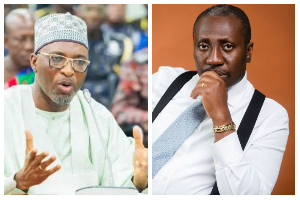 A photo collage of Mohammed-Mubarak Muntaka (L) and Alexander Kwamina Afenyo-Markin (R)
A photo collage of Mohammed-Mubarak Muntaka (L) and Alexander Kwamina Afenyo-Markin (R)
The Member of Parliament (MP) for Asawase, Mohammed-Mubarak Muntaka, has threatened that the Majority Caucus will vote to take away all the privileges of the Minority Leader if he defies the resolution passed by the House on Ghana’s delegation to the ECOWAS Parliament.
Speaking on the floor of Parliament on July 22, 2025, when the resolution was passed, Mohammed-Mubarak, who is also the Minister of the Interior, indicated that the Minority Leader, Alexander Kwamina Afenyo-Markin, has no option but to accept the decision of the House.
He said that he was surprised that Afenyo-Markin would be the person challenging the decision of the House because he was at the receiving end when a member of his caucus defied the resolution of the House on the delegation to the ECOWAS Parliament.
“We are capitalising on our knowledge of the ECOWAS and Pan-African Parliaments to make it difficult for this House. Because in the case of the ECOWAS Parliament, if a member is elected, even if his Parliament doesn’t send him and he still insists he wants to be a member, the ECOWAS Parliament will support him.
“We have a clear example when a former whip in this House, from our colleagues on the other side, decided to defy leadership. When he went there, interestingly, the Minority Leader, who is taking an interim position, was the one who was disadvantaged. So, I thought that if for nothing, he should learn from that. He should learn from that history that being and taking an interim position will come and haunt you one day,” he said.
“This House, if it becomes necessary, we may have to vote and support you. If the Minority Leader insists, he wants to go to ECOWAS, he must be stripped of all the other privileges of the Minority Leader. We are talking about IPU. We are talking about CPA,” he added.
The minister said that Afenyo-Markin’s privileges must be taken away because he cannot be enjoying them and still represent the country at the ECOWAS Parliament.
The Majority Leader, Mahama Ayariga, while moving the motion on the composition of membership for representation at the Parliament of the Economic Community of West African States (ECOWAS), proposed some amendments, including the replacement of Minority Leader Afenyo-Markin with his deputy, Patricia Appiagyei.
Despite opposition from members of the Minority Caucus, the House, by a voice vote, adopted the amended list, made up of George Ricketts-Hagan as Leader, Emmanuel Kwame Bedzrah, Laadi Ayii Ayamba, Eric Afful, Dominic Napare, Patricia Appiagyei, and Kwame Anyimadu-Antwi as members, with Millicent Yeboah Amankwah as observer.
Watch a video of Muntaka’s remarks below:
BAI/VPO
Meanwhile, you can also watch videos from the NPP’s National Delegates Conference below:
Paul Amaning emerges as OPDAG National President
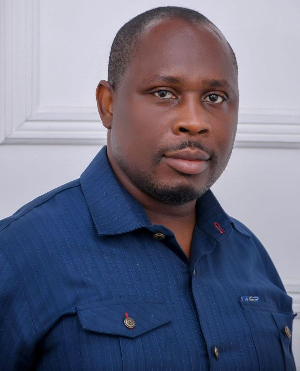 OPDAG elects Dr Paul Kwabena Amaning as its new National President
OPDAG elects Dr Paul Kwabena Amaning as its new National President
The Oil Palm Development Association of Ghana (OPDAG) has officially elected Dr Paul Kwabena Amaning, a seasoned agribusiness strategist and native of Akyem Asuom, as its new National President.
The announcement was made during the 3rd Annual OPDAG Conference, held on Thursday, July 24, 2025.
Paul Amaning’s election signals a renewed vision and energy for the oil palm sector in Ghana.
Delegates from across the country threw their weight behind Amaning, recognizing his unwavering commitment to agricultural transformation, policy reform, and sustainable value-chain development.
With years of experience in agribusiness leadership and advocacy, Dr Amaning is widely respected for his bold ideas and practical solutions.
He has pledged to unify stakeholders from smallholder farmers to large-scale processors in a mission to boost production, ensure fair pricing, and strengthen Ghana’s position in the global oil palm market.
In his victory speech, Dr Amaning emphasized sustainability, innovation, and inclusiveness as his top priorities.
“We are not just cultivating oil palm; we are cultivating national development,” he stated.
“Together, we will drive a bold agenda that empowers farmers, protects our environment, and strengthens local economies.”
The leadership of OPDAG expressed confidence in his ability to steer the Association into a new era of impact and growth.
SP/AME
How Virtual Reality is enhancing business and customer experience
Complete stalled road projects – Merban Capital tells govt
Head of Finance at Merban Capital, Nelson Cudjoe Kuagbedzi, has urged the Mahama administration to prioritise the completion of stalled road projects under its ‘Big Push Agenda’ rather than initiating new ones.
Speaking during a panel discussion on Channel One TV with Vivian Kai-Lokko ahead of the 2025 Mid-Year Budget Presentation on Thursday, July 24, Kuagbedzi said it would be economically unwise to abandon ongoing projects for new ones.
“This year [2025], the government should concentrate more on finishing stalled projects. Road is a good thing because where roads are, you see small businesses springing up. The Big Push money should be designated for the completion of these stalled projects,” he said.
He stressed that funding under the ‘Big Push Agenda’ should be allocated to completing key projects such as the Nsawam and Cape Coast roads.
“You cannot leave huge projects like the Nsawam road, the Cape Coast road, and start a new one. It will not make economic sense,” he stated.
…..
Explore the world of impactful news with CitiNewsroom on WhatsApp!
Click on the link to join the Citi Newsroom channel for curated, meaningful stories tailored just for YOU:
https://whatsapp.com/channel/0029VaCYzPRAYlUPudDDe53x
No spam, just the stories that truly matter! #StayInformed #CitiNewsroom #CNRDigital
Father killed, son injured in armed robbery attack on Bole-Bamboi highway
A man identified as Balenbogma, believed to be in his 50s, has been shot and killed by armed robbers, while his son, in his 20s, is in critical condition following a brutal attack on the Bole-Bamboi highway.
The incident occurred around 6:30 p.m. at Taselema, a community along the Techiman-Wa route.
The victims were reportedly travelling from Sunyani to Lawra to attend their late mother’s burial when they encountered the armed robbers.
Eyewitnesses, including some commercial drivers who narrowly escaped, told Adom News that the robbers have been capitalising on the poor road conditions to stage frequent ambushes.
They called on the government to urgently rehabilitate the road to help curb both accidents and robberies. In some instances, the criminals are said to have gone as far as sexually assaulting female passengers.
The deceased’s body has been deposited at the Taselema Polyclinic mortuary, while his injured son is receiving treatment at the same facility.
Residents and commuters are urging authorities to improve road infrastructure and increase police patrols to ensure safety on the stretch.
Foreign Affairs Ministry denies issuing Ghanaian passports to non-citizens
The Ministry of Foreign Affairs has dismissed viral claims suggesting Ghanaian passports are being issued to foreign nationals, describing the allegations as false and baseless.
In a statement issued Thursday, July 24, the Ministry said it had taken note of a video circulating on social media that purportedly accuses officials of granting Ghanaian passports to non-citizens.
The Ministry firmly denied the allegation, stating that all passport applications undergo rigorous checks to verify the applicant’s nationality.
“The requisite documents submitted for passport applications are subjected to vigorous scrutiny,” the Ministry noted.
“The submission of these documents does not guarantee the automatic issuance of passports.”
The statement said beyond document checks, applicants are also vetted in person through interviews to further verify the details provided, the Ministry explained.
Reiterating its commitment to safeguarding the integrity of Ghana’s passports, the Ministry said it continually invests in advanced security systems and staff training to prevent breaches.
It also warned that presenting fake or forged documents for services is a criminal offence under Sections 158, 159, 166, and 169 of the Criminal Offences Act 1960 (Act 29), and offenders will be prosecuted accordingly.
DISCLAIMER: The Views, Comments, Opinions, Contributions and Statements made by Readers and Contributors on this platform do not necessarily represent the views or policy of Multimedia Group Limited.
DISCLAIMER: The Views, Comments, Opinions, Contributions and Statements made by Readers and Contributors on this platform do not necessarily represent the views or policy of Multimedia Group Limited.
900 Jobs saved as gov’t recapitalises NIB – Ato Forson
Finance Minister Dr. Cassiel Ato Forson has sharply criticised the previous New Patriotic Party (NPP) administration over its handling of Ghana’s banking sector, contrasting it with the Mahama-led government’s approach to reviving the struggling National Investment Bank (NIB).
“Mr Speaker let me state this, unlike the previous administration, we chose to spend to save a bank rather than spend to collapse a bank,” Dr. Forson declared in Parliament when he presented the mid-year budget review on Thursday July 24.
According to the Minister, the Mahama administration has successfully recapitalised NIB through what he described as an “ambitious and credible plan” aimed at restoring profitability and ensuring long-term sustainability.
He outlined key steps taken by the government, including:
– A GHS450 million capital injection
– Issuance of GHS1.5 billion in re-marketable bonds
– Transfer of GHS500 million worth of government shares in Nestlé Ghana Limited to the bank
These interventions, he noted, have transformed NIB’s capital adequacy ratio from a deeply negative -51.13% in December 2024 to a healthy 23% in May 2025.
“By taking these major steps, we have preserved depositors’ funds valued at GHS6.4 billion. We have also saved over 900 direct jobs at the NIB. We have preserved an indigenous Ghanaian bank,” he said.
Dr. Forson assured the public that NIB has fully regained stability, liquidity, and capacity to serve as a strong player in the banking sector.
“I want to use this opportunity to assure the people of Ghana that our indigenous bank, the NIB, is now prime for business. More importantly, NIB is back, NIB is now liquid, NIB is now safe, NIB is fully capitalised. We therefore encourage all and sundry to do business with the NIB,” he added.
Read also
Ato Forson: We inherited Cocoa sector with GHC32bn liabilities
“There’s no evidence that data is running fast, check your settings”- Sam George
Minister for Communications and Ningo-Prampram MP Samuel Nartey George has dismissed widespread claims that mobile data bundles are depleting too quickly, saying investigations have found no wrongdoing by telecom companies.
He pointed to user-side issues like background app activity and automatic updates as the likely cause of rapid data usage. “There is no evidence to show right now that those claims are real,” Mr George said, citing comedian DKB’s recent complaint and retraction after a probe was launched.
‘Too Late was birthed out of frustration’
 Wendy Shay is a Ghanaian Afropop singer
Wendy Shay is a Ghanaian Afropop singer
Female songstress, Wendy Shay, has recounted how her recent hit song, “Too Late,” came about.
According to her, while speaking during an interview on 3Music TV, and monitored by GhanaWeb, a misunderstanding arose after she released her rendition of “Vivian,” a Cameroonian song that recently made wave on the Internet.
Wendy Shay explained that she and her team reached out to the originator of the “Vivian” song – Prince Aimé, to seek licensing to be able to use it.
But she said after paying a hefty but undisclosed amount of money to Prince, another person surfaced by name Waxy Kay, claiming ownership to the song instead, demanding that Wendy Shay pays another sum of money to him.
The artiste added that after paying the money for the second time, Waxy Kay reached out again to demand more money, threatening to remove the song from all streaming platforms, simply because the song was doing well.
Wendy Shay continued that she was frustrated with everything that was happening at the time and so she poured her emotions and frustrations into a new project which ended up becoming her hit single, “Too Late.”
However, she said the “Too Late” song wasn’t going as she wanted it to as she felt something was missing until Tracy Shay entered the picture and danced to the song, which ended up blowing up and pushing the song to mainstream media.
Wendy Shay added that Tracy has been nothing but a blessing since their paths crossed and she’s particularly grateful “this child came into my life as a blessing and to show gratitude to God, to the universe, whatever connected us, I just need to do something for her in return.”
Wendy added that she has refused to give attention to what critics have been saying about her, but only wants to show appreciation and do something for Tracy in return.
Meanwhile, you can watch GhanaWeb TV’s exclusive interview with Arathejay below:
PAT/AE
Cedi no ‘apicki’ – Minister of Finance declares
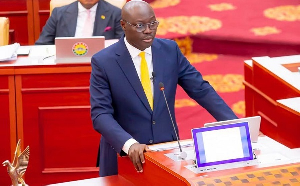 Dr Cassiel Ato Forson, Minister of Finance
Dr Cassiel Ato Forson, Minister of Finance
The Minister of Finance, Dr Cassiel Ato Forson, has lauded the recent performance of the Ghana cedi, describing it as one of the most significant currency recoveries in the country’s history.
Delivering the 2025 Mid-Year Budget Review in Parliament on Thursday, July 24, 2025, the minister announced that the cedi had recorded major gains against the US dollar, the British pound, and the euro within the first six months of the year.
“Mr speaker the Ghana cedi used to trade against the US dollar at 17, as at yesterday trading at 10.4. Mr Speaker, similarly the Ghana cedi which was once trading at 21 cedis to the British pound was trading at 14.1 as at yesterday 23rd July 2025,” he said.
According to the minister, the cedi appreciated by 46% against the US dollar, 30.3% against the British pound, and 25.6% against the euro as at the end of June 2025.
He emphasised that this marks a sharp reversal from the depreciation trends of the past three years.
“This level of appreciation has never happened in the history of our country. Ghana cedi no apicki,” he stated.
Dr Cassiel Ato Forson attributed the gains to strong fiscal consolidation, tight monetary policy, improved external sector performance, renewed investor confidence, favourable market sentiment, and the successful completion of the fourth review of Ghana’s programme with the International Monetary Fund.
The 2025 Mid-Year Budget Review is in line with Article 179 of the 1992 Constitution and Section 28 of the Public Financial Management Act, 2016 (Act 921), which requires the Minister of Finance to provide Parliament with a review of the national budget and economic performance.
AS/AE
French media giant Canal+ acquires MultiChoice in $3 billion deal
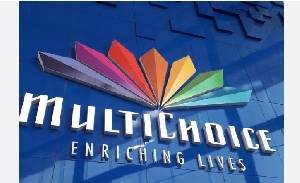 Canal+ has bought MultiChoice for $3billion
Canal+ has bought MultiChoice for $3billion
A French media conglomerate, Canal+, has acquired MultiChoice Group in a $3 billion (approximately 55 billion rand) deal.
Canal+ previously owned a 45% stake in MultiChoice, owners of DStv and GoTV; therefore, the recent acquisition gives it the rest of the 55% stake.
The deal, according to vanguardngr.com was approved by South Africa’s Competition Tribunal on July 23, 2025.
The tribunal’s approval comes after months of negotiations and regulatory reviews, adding that it imposed several public interest conditions to protect local content and maintain South Africa’s media sovereignty.
The deal is, however, expected to be finalised by October 8, 2025.
The Chief Executive Officer of Canal+, Maxime Saada, said, “The combined group will benefit from enhanced scale, greater exposure to high-growth markets and the ability to deliver meaningful synergies.”
As part of the Competition Tribunal’s conditional approval, Canal+ has committed to spending approximately 26 billion rand over the next three years on initiatives aligned with South Africa’s public interest objectives.
In a joint statement, both companies noted their commitment to the acquisition.
“We will maintain funding for South African general entertainment and sports content, providing local content creators with a strong foundation for future success,” they said.
Canal+ started the takeover bid in 2023 with a mandatory buyout offer of 125 rand per share, valuing MultiChoice at around $3 billion.
MultiChoice has more than 14.5 million subscribers in 50 sub-Saharan African countries, as well as flagship platforms like DStv and GOtv.
SSD/AE
Watch the latest episode of BizTech below:
Young Don apologises to Otumfour, President Mahama, Ajagurajah & others
Controversial US-based Ghanaian social commentator, Young Don, has publicly issued a heartfelt apology to Asantehene Otumfuo Osei Tutu II, Bishop Ajagurajah, and Ghanaians at large following a recent accident that he says changed his life.
Taking to his official TikTok page, the outspoken media personality opened up about the traumatic incident and how it had led to deep personal reflection and spiritual awakening.
In a remorseful tone, Young Don admitted that he had hurled unwarranted insults at some of Ghana’s
10 Key Takeouts from Finance Minister’s 2025 Update to Parliament
Finance Minister Dr Cassiel Ato Forson on Thursday, July 24, 2025, presented the Mid-Year Fiscal Policy Review to Parliament, reaffirming that the government will not seek additional funds beyond what was already approved for the year.
He said the government remains within the limits set out in the 2025 budget and is focusing on managing expenditure, improving revenue collection, and completing critical infrastructure projects while maintaining macroeconomic stability under the ongoing programme with the International Monetary Fund.
Below are ten key points from Dr Forson’s presentation to the House:
1. No request for extra funds
Dr Forson told Parliament that the government is not seeking a supplementary budget. Projections for GDP growth (4 per cent), non-oil GDP growth (4.8 per cent), and end-year inflation (11.9 per cent) remain unchanged.
“Mr Speaker, I am not asking for additional money,” he said.
2. Public debt drops by GH¢113.7 billion
Ghana’s total public debt declined from GH¢726.7 billion in December 2024 to GH¢613 billion by June 2025, representing a reduction of GH¢113.7 billion. The debt-to-GDP ratio also fell from 61.8 per cent to 43.8 per cent.
“This is the first time in our history that we are recording a negative debt accumulation rate of 15.6 per cent,” Dr Ato Forson said.
3. GH¢1.6 billion revenue loss at ports
The Minister reported that customs revenue fell short by GH¢1.6 billion due to smuggling and fraudulent practices at the ports, particularly in Tema. He announced the deployment of artificial intelligence and enhanced cargo tracking systems to curb leakages.
4. Audit into 55 stalled infrastructure projects
A forensic audit is underway to investigate 55 stalled projects where contractors accessed loan funds without corresponding work. Some are also reported to have submitted inflated variation claims.
5. GH¢150 million in unearned salaries identified
Payroll audits across all 16 regions revealed over 14,000 unverifiable workers and 53,311 separated staff still drawing salaries. The Ghana Audit Service estimates that at least GH¢150 million in unearned salaries will be recovered.
“Persons who validate ghost names will be held personally liable,” Dr Ato Forson warned.
6. 24 projects to be completed by 2028
The government has identified 24 infrastructure projects, including hospitals, schools, roads, and markets, that are over 70 per cent complete. These will be prioritised for completion by 2028. Dr Ato Forson said no changes will be made to the scope or cost of these projects.
7. Sinking funds set up for debt servicing
Two dedicated sinking fund accounts, one in cedis and one in US dollars, have been established to meet debt obligations due between 2026 and 2028. The move is aimed at reducing pressure on future budgets.
8. Domestic borrowing requirement reduced
The government’s domestic borrowing needs have been revised downwards from GH¢64.1 billion to GH¢59.8 billion. Dr Forson attributed this to improved market conditions and falling treasury bill rates.
9. Energy sector levies to generate GH¢2.9 billion more
Amendments to the Energy Sector Levies Act are expected to yield an additional GH¢2.9 billion, which will go toward clearing arrears and supporting power supply.
10. Ghana’s credit rating improves
Fitch Ratings has upgraded Ghana’s long-term foreign currency issuer rating from ‘Restricted Default’ to ‘B- with a stable outlook’. This marks the first credit rating improvement since 2021.
“This reflects renewed investor confidence in Ghana’s reforms,” Dr Ato Forson stated.
Africa must move beyond rhetoric on labour and migration
The Director of Diaspora Affairs at the Office of the President, Kofi Okyere-Darko (KOD), has called on African leaders to adopt a deliberate and results-driven approach to labour dignity and diaspora inclusion.
He made the call at the 2025 African Labour and Employment Summit (ALES) in Accra on Thursday, July 24. The summit was held on the theme “The Future of Work and Labour Migration in Africa.”
KOD stressed the importance of moving beyond empty promises and rhetoric, indicating that “It should not be a talk show, as always.”
“We must be intentional. The policies exist, the right people are in the room—now is the time to act.”
KOD outlined the tangible steps Ghana is taking through the Diaspora Affairs Office, particularly its work with the Intersectoral Implementation Committee (ISIC).
According to him, the office is building partnerships across institutions and borders to integrate diaspora skills, investments, and entrepreneurship into national labour solutions.
He further emphasised the urgency for African nations to create structured systems to:
• Recognise skills across borders
• Protect migrant workers
• Formalise remittance channels
These steps, he said, are crucial for reducing economic dependency and improving productivity across the continent.
“We must place people at the heart of our labour policies,” KOD added. “Africa’s youth, both at home and in the diaspora, are counting on us to get it right.”
His remarks aligned with the summit’s larger focus on preparing Africa’s workforce for future challenges, including digital transformation, labour mobility, and the implementation of the Africa Continental Free Trade Area (AfCFTA).
“In closing, let’s not stop at vision statements. Let’s commit to real outcomes. Together, we can build a labour future worthy of Africa’s potential,” he said, earning applause from participants.
The summit continued with a series of panel discussions, workshops, and strategy sessions on youth employment, technology, and diaspora-driven development.
GJA orders rerun of Ashanti Region Chairperson elections
The Elections Dispute Adjudication Committee (EDAC) of the Ghana Journalists Association (GJA) has ordered a re-run of the Ashanti Region Chairperson elections following the discovery of significant irregularities during the June 30, 2025, polls.
In a decision released on Thursday, July 24, 2025, the committee stated that after a careful review of the petition challenging the election outcome and thorough consideration of the evidence and arguments from all parties involved, it had concluded that a re-run was necessary to protect the integrity and fairness of the electoral process.
“Our decision is informed by critical irregularities that took place prior to and during the elections. This includes the failure to adhere to some GJA constitutional provisions, culminating in the generation of a supplementary list on the day of elections, with the eligibility of some members on the supplementary list being challenged.”
One of the major concerns cited was that a voter registered in the Greater Accra Region was nonetheless allowed to cast a ballot in the Ashanti Region.
With the election being decided by just one vote, the committee said the irregularities could have significantly impacted the outcome.
In light of these infractions, we have concluded that re-running the elections is the most reasonable, fair, and just course of action to restore the confidence of the members and ensure that the electoral process reflects the true will of the members. “
New Directives for the Re-run
The EDAC has directed that the Ashanti Region Chairperson elections be re-run within fourteen (14) working days from the date of the announcement. It issued the following guidelines to govern the re-run:
1. The GJA Elections Committee shall publish a full list of eligible voters in the dailies, and copies of the list shall be provided to all contestants at least 3 clear working days before the elections.
2. No supplementary list shall be created.
“We urge all members to take keen interest in the implementation of these directives to ensure that the re-run elections are conducted with the utmost integrity,” the statement urged.
Background
The decision comes after the EDAC earlier requested the postponement of the swearing-in of Ashanti Region executives following a petition challenging the regional election results.
In a statement dated July 9, the committee confirmed it had received a petition contesting the outcome of the election for the position of Ashanti Region Chairperson. The EDAC noted that the petition met all constitutional requirements for further investigation.
With this ruling, the Ashanti Region will head back to the polls, as the GJA seeks to safeguard the credibility of its internal democratic processes.
4.5 billion IMF funds used 6 days before Mahama administration began – Finance Minister
Finance Minister Dr Cassiel Ato Forson has revealed that the GH₵4.5 billion disbursed by the International Monetary Fund (IMF) was utilised between January 1 and January 6—just six days before the current Mahama-led administration assumed office.
Presenting the 2025 Mid-Year Budget Review, Dr Forson explained that the funds were used by the previous government to cover critical expenditures. As a result, no arrears were passed on to the current administration.
“It is important to note that there was no build-up in arrears payable during the period under review, signaling strong commitment control and fiscal discipline,” he said.
He further noted that Ghana’s fiscal deficit for the first half of the year was mainly financed from domestic sources, with net domestic financing recorded at GH₵13.1 billion—significantly below the GH₵18.7 billion target.
Net foreign financing stood at GH₵2.8 billion, primarily from the use of the GH₵4.5 billion IMF disbursement.
Despite the early-year spending and ongoing economic challenges, Dr Forson assured that Ghana remains on track with the implementation of the IMF-supported programme.
He added that the country has borrowed less than initially projected, which he described as evidence of prudent fiscal management and strong expenditure control.
The Finance Minister stressed that the current government differs significantly from the previous NPP administration, particularly in its fiscal discipline and approach to managing the economy.
He assured that efforts are ongoing to stabilise the economy while maintaining transparency in fiscal operations.
Between January 1st and 6th, the IMF disbursement of 4.5 billion was spent, six days before the Mahama administration took office — Cassiel Ato Forson, Minister for Finance #MidYearBudgetReview pic.twitter.com/jGf2gt5VgZ
— Joy Prime (@JoyPrimeTV) July 24, 2025
KATH CEO courts Bank of Ghana for support
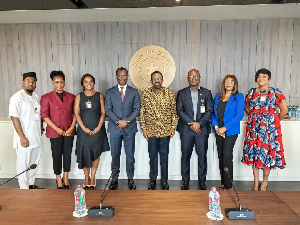 Dr. Baidoo (3rd from right) in a group picture with the Governor, Dr. Asiama and management memebrs
Dr. Baidoo (3rd from right) in a group picture with the Governor, Dr. Asiama and management memebrs
The Chief Executive Officer (CEO) of the Komfo Anokye Teaching Hospital KATH, Dr. Paa Kwesi Baidoo, has met the Governor of the Bank of Ghana (BOG), Dr. Johnson Pandit Asiama, and his management to court support for the retooling of the hospital.
The meeting, held at the headquarters of the bank in Accra, formed part of the sustained efforts by the KATH CEO to seek state and corporate funding for addressing some of the equipment and infrastructure deficit challenges facing the hospital.
KATH occupies a unique position in the health care delivery system of the country as it receives referrals from 12 out of 16 regions by virtue of its strategic location and wide range of specialist services.
Regrettably, in spite of its highly skilled workforce and the huge demand for its services, it lacks the requisite stock of equipment and other infrastructure required for the comprehensive provision of specialist and sub-specialist care to the public; hence, the drive by the CEO to reach out to corporate Ghana for support.
Dr. Baidoo told the meeting, which had in attendance the two Deputy Governors of the bank and some other senior management, that the obsolete nature of some of the existing equipment and the absence of other critical ones were impeding the delivery of cutting-edge clinical services to the public.
“Currently, most of the critical equipment such as C.T. scans, Magnetic Resonance Imaging (MRI), Fluoroscopy, Oxygen Plants and Central Sterilisation equipment at the hospital are either down or working at fault. Vital equipment like a Catheterisation Laboratory (CATHLAB) and Mammogram are not even available at all”, he noted.
He said given that the state did not have the budget to fully address the above challenges, it would not be out of place if corporate entities like the BoG assisted with funding to procure such vital life-saving equipment to enable the hospital provide the best of specialist services to the public.
Dr. Asiama acknowledged that health facilities like KATH, which were providing critical services to the public, deserved to be supported and the appeal made by its CEO would be seriously considered.
He said the management of the bank would study the list of the critically needed equipment submitted by the CEO and take a firm decision on what to do as soon as possible so that the hospital could be supported to serve the public better.
GA
Have confidence in Ghana’s economic recovery
Finance Minister Dr. Cassiel Ato Forson has called on Ghanaians to remain united and have faith in the country’s economic recovery efforts, assuring that better days lie ahead.
Delivering the 2025 Mid-Year Budget Statement to Parliament on Thursday, July 24, Dr. Ato Forson expressed optimism about the future of the Ghanaian economy, noting that ongoing reforms are laying the foundation for sustained growth, job creation, and renewed investor confidence.
“Mr. Speaker, as we look forward, more jobs will be created, confidence will deepen, and the Ghanaian economy will stand tall again—not just in the sub-region, but on the global stage,” he said.
Dr. Forson, however, emphasised that national progress would require unity and a collective sense of purpose.
“To do this, Mr. Speaker, we must stay united as a people and eschew divisiveness. We must continue to have faith in our country, Ghana!” he added.
Acknowledging the sacrifices made by various segments of society during recent economic challenges, the Finance Minister said both businesses and ordinary citizens had borne the brunt of the crisis.
“We understand businesses went through some sacrifices during the turbulent economic challenges, but so did the ordinary Ghanaian,” he noted.
Dr. Forson reaffirmed the government’s commitment to pursuing inclusive growth strategies and policies that would ensure shared prosperity for all Ghanaians.
Mid-Year Budget: Sustain economic gains – Timore Boi tells govt
…..
Explore the world of impactful news with CitiNewsroom on WhatsApp!
Click on the link to join the Citi Newsroom channel for curated, meaningful stories tailored just for YOU:
https://whatsapp.com/channel/0029VaCYzPRAYlUPudDDe53x
No spam, just the stories that truly matter! #StayInformed #CitiNewsroom #CNRDigital
Minority stages walkout ahead of 2025 mid-year budget presentation
The Minority has staged a walkout after Speaker Alban Bagbin declined to allow Minority Chief Whip, Frank Annoh-Dompreh, to give a preliminary statement before the Finance Minister Dr Cassiel Ato Forson presents the 2025 mid-year budget.
Earlier, a report from MyJoyOnline indicated that the Minority Caucus would not participate in the presentation of the mid-year budget.
Mahama promises to renovate Atta Mills Presidential Library
The government has initiated steps to renovate the John Evans Atta Mills Presidential Library, nearly a decade after it fell into disrepair.
President John Mahama announced the plan on Thursday, July 24, during a wreath-laying ceremony marking the 13th anniversary of the late president’s death at the Asomdwee Park in Cape Coast.
Commissioned in July 2016 under the Mahama administration, the library was designed to serve as a center for research, education, and tourism, preserving the legacy of the late president.
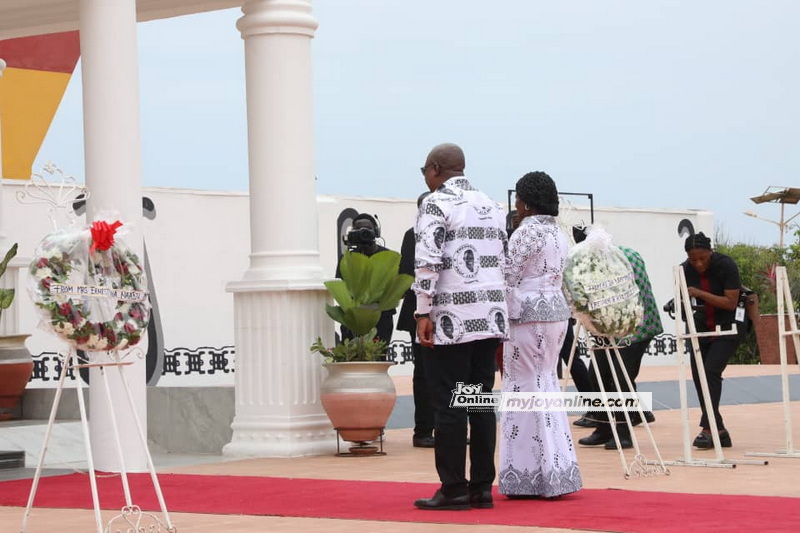
However, years of neglect have left the facility in a deteriorated state, sparking criticism from the public and family members.
Addressing the gathering, President Mahama confirmed that plans were underway to restore the facility.
“The Honourable Kofi Totobi Quakyi has been involved with that library from the time it was built. After we left the office, it was handed over to the University of Cape Coast, I remember. It fell into a state of disrepair, and we have held this discussion already.
“I can tell you that Kofi Totobi and a small group are already working on bringing that memorial library back to the shape in which it should be, and we can be sure that we will let it achieve the objective for which it was set up,” President Mahama said.
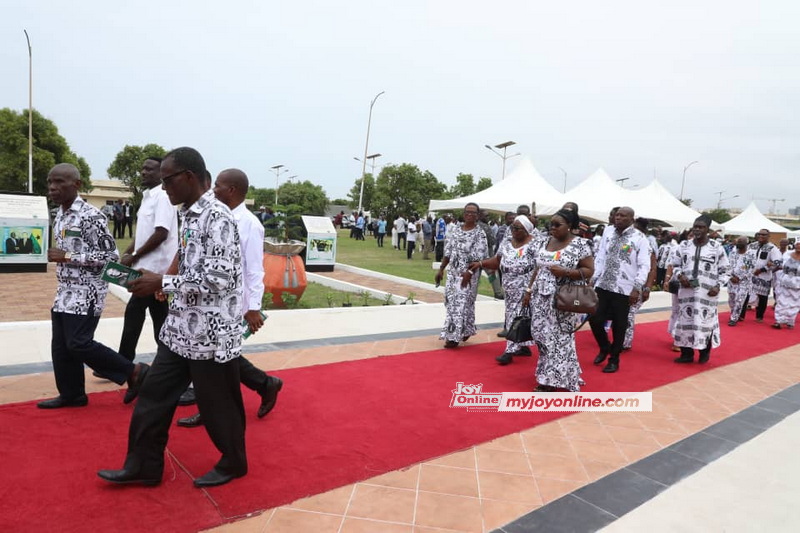
Family members, including the late president’s sister, Araba Kwashie, had earlier appealed to the president to revive the library.
“The library, which was inaugurated about 10 years ago in Cape Coast, seems not to have anything going on there. As we are back, [We hope] something will happen,” she said.
The ceremony was attended by key figures, including Vice President Naana Jane Opoku-Agyemang, senior government officials, NDC party leaders, and relatives of the late president.
DISCLAIMER: The Views, Comments, Opinions, Contributions and Statements made by Readers and Contributors on this platform do not necessarily represent the views or policy of Multimedia Group Limited.
DISCLAIMER: The Views, Comments, Opinions, Contributions and Statements made by Readers and Contributors on this platform do not necessarily represent the views or policy of Multimedia Group Limited.
Assistant who accused Kanye West of sexual assault ‘in hiding’
 Kanye West has been accussed of sex trafficking, stalking, assault and rape.
Kanye West has been accussed of sex trafficking, stalking, assault and rape.
Kanye West’s former assistant is scared and still in hiding after filing sexual assault claims against the rapper, her lawyer has told the BBC.
Lauren Pisciotta, 36, who started working for West in 2021, first filed a lawsuit against him in June 2024 alleging she was sexually harassed and stalked.
In updated claims, which were filed this year, she accused West, also known as Ye, of sex trafficking, stalking, assault and rape.
West denies her claims, which he calls a “fantasy fiction”.
The civil case is due to return to court in the US next month, but Pisciotta’s lawyer says his client is currently in hiding and is “afraid”.
Speaking to the BBC, Arick Fudali said Ms Pisciotta had now deleted most of her internet presence and is now “just sort of sitting around and hiding – letting this lawsuit play out”.
He added: “It’s really sad – she’s gone through a lot. She is suffering and has been suffering since she began working for Mr West.”
Ms Pisciotta started working for West in 2021 and first filed her lawsuit against the rapper on 3 June 2024 alleging sexual harassment, breach of contract and wrongful termination.
Earlier this month, an amended claim was filed alleging that six days later she became a victim of targeted “swatting”, which she claims West was organising.
Swatting involves the reporting of serious crimes at a specific location in order to prompt law enforcement to raid the site.
In Pisciotta’s amended lawsuit, filed on 10 July 2025, she claims she was “bombarded with unwanted, harassing, and alarming” visits from the police.
In one instance, she says the Palm Beach Sheriff’s office performed an armed raid at her property in Florida after receiving a report thatPisciotta had killed her own mother.
Pisciotta also claims that around this time she started to receive phone calls from individuals warning her not to pursue the lawsuit and that she would not “prevail” against West.
On one occasion, while working on the DONDA album, Pisciotta claims that West came to her hotel room and demanded to use her shower. The document details that after some time he came out of the bathroom and dropped his towel revealing his penis and she claims he raped her orally.
Pisciotta also claims that West frequently engaged in sexual activity with Yeezy – the company founded by the rapper – staff members in the office and that he would record the encounters and send them to her. She says he would frequently text her about sexual fantasies involving her.
Pisciotta also claims that West “exposed his employees to extreme displays of racism and antisemitism on a daily basis.
“Ye constantly used derogatory, antisemitic slurs, and interrogated employees he suspected were Jewish. On multiple occasions, Ye demanded that his assistants and other employees draw swastikas in the workplace,” the lawsuit says.
West responds
In an interview with the BBC’s Fame Under Fire podcast, Mr Fudali highlighted that some of West’s posts on social media appear to admit some of her claims.
Mr Fudali told presenter Anoushka Mutanda-Dougherty: “He [West] has a song called Heil Hitler. He calls himself a walking ‘Me Too’. He admits to sexually harassing his employees. You see all that he’s done publicly, you can imagine what he has done in private.”
West’s social media posts do not directly admit guilt to any legal claims and his team strongly deny the allegations.
Fudali says all of West’s tweets will be brought up as evidence during his deposition with the rapper and shown in court during the trial.
The BBC asked West’s team for a response to the claims. His team did not reply but West’s spokesperson previously told USA Today: “Lauren Pisciotta’s amended complaint is the fourth version she has advanced. Each new revision contradicts the others.”
It goes on to call the latest claim a “breathless new instalment of fantasy fiction [that] discredits all past, present and future testimony”.
The spokesperson added: “We stand ready to annihilate Ms Pisciotta’s tall tales before a jury − an exoneration so inevitable that even she, lost in her fog of fantasy, must surely see it coming.”
Address Ablekuma North violence to avoid future election bloodshed – Ntim Fordjour
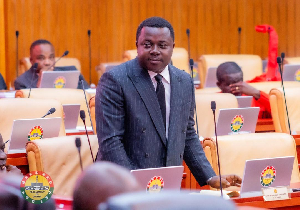 Ranking Member on Parliament’s Committee on Defence and Interior, Rev John Ntim Fordjour
Ranking Member on Parliament’s Committee on Defence and Interior, Rev John Ntim Fordjour
The Member of Parliament for Assin South Constituency, John Ntim Fordjour, has called for the immediate arrest and prosecution of individuals responsible for the violence that characterized the 2024 parliamentary election rerun in the Ablekuma North Constituency.
In an X post on Thursday, July 24, 2025, the MP accused the opposition National Democratic Congress of being complicit in the violence, warning that a failure to ensure justice will reduce Ghana’s democracy to state-sponsored violence.
“Ablekuma North election violence needs to be addressed seriously to avoid bloodshed in future elections. Democracy cannot be reduced to government-sponsored violence. NDC thugs complicit are still walking free. Arrest all now and prosecute them before the Akwatia by-election,” wrote the MP, who is also the Ranking Member on the Defence and Interior Committee of Parliament.
The MP’s post comes on the heels of a decision by the Minority Caucus to boycott the 2025 Mid-Year Budget Review presented by the Minister for Finance, Dr. Cassiel Ato Forson, on Thursday.
At the commencement of proceedings on Thursday, the Minority indicated their intent to make a statement on the floor regarding electoral violence.
However, the Speaker of Parliament, Alban Bagbin, while noting the importance of the issue, denied the request, stating that the matter would be thoroughly discussed at a later date.
Displeased by the Speaker’s directive, the Minority members staged a walkout from the chamber in protest.
The Caucus visited the Dean of the Diplomatic Corps, the Presidency, and the Coalition of Domestic Electoral Observers (CODEO) to raise concerns and demand immediate action on the Ablekuma North electoral violence.
Ablekuma North election violence needs to be addressed seriously to avoid bloodshed in future elections. Democracy cannot be reduced to government-sponsored violence.
NDC thugs complicit are still walking free. Arrest all now and prosecute them before Akwatia by-election. pic.twitter.com/iIlOzub7x9
— John Ntim Fordjour MP (@NtimFordjour) July 24, 2025
GA
Dr Ato Forson breaks down allocations in 21 key areas
 Dr Cassiel Ato Forson is the Minister of Finance
Dr Cassiel Ato Forson is the Minister of Finance
Contrary to claims that the government has chalked up some successes in the first six months of being in office because of non-spending, the Minister of Finance, Dr Cassiel Ato Forson, has noted that so far, the government has spent GH¢114 billion.
He said, “Contrary to the perception that we are not spending, we are indeed spending and spending at the right places. We are making the right investments”
Speaking during the presentation of the 2025 Mid-Year Budget review, the minister listed some of the spending done by the government.
These include:
1. GH¢10 billion to domestic bondholders has been paid;
2. GH¢2.9 billion to the District Assemblies Common Fund (DACF) has been paid;
3. GH¢9.1 billion to the energy sector for a stable power supply has been paid;
4. GH¢5 billion of arrears have been paid;
5. GH¢2.9 billion to the Ghana Education Trust Fund (GETFund) has been paid;
6. GH¢1 billion to the free secondary education programme has been paid;
7. GH¢2.7 billion to the National Health Insurance Scheme has been paid;
8. GH¢1.4 billion for National Health Insurance claims has been paid;
9. GH¢252 million for vaccines and essential medicines has been paid;
10. GH¢72.8 million as Capitation Grant has been paid;
11. GH¢477 million to LEAP beneficiaries has been paid;
12. GH¢895 million to the School Feeding Programme has been paid;
13. GH¢122.8 million for BECE registration has been paid;
14. GH¢300 million to the No Fee Stress Policy has been paid;
15. GH¢52 million as Teacher Training Allowance has been paid;
16. GH¢369.9 million as Nursing Training Allowance has been paid;
17. GH¢25 million as Assembly Members’ allowance has been paid;
18. GH¢21 million for the National Apprenticeship Programme has been paid;
19. GH¢34.5 million to the Adwumawura Programme has been paid;
20. GH¢2 billion as Goods and Services to run an effective and efficient government machinery has been paid; and
21. GH¢2 billion to save the National Investment Bank (NIB) has been paid.
SSD/AE
Watch the latest episode of BizTech below:
Wetin cause tension between Thailand and Cambodia
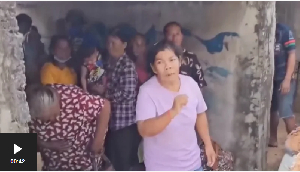 Pipo take shelter afta di Thailand and Cambodia troops begin shoot each oda
Pipo take shelter afta di Thailand and Cambodia troops begin shoot each oda
Clash between Thailand and Commbodia military for one border wey di two kontris dey drag, don kill at least 12 pipo, Thai authority tok.
Dis fight don carry di border argument, wey don dey occur for more dan 100 years between di two South Asia neighbours enta anoda level.
Most of di people wey die na civilians from three of Thailand provinces according to Thai army.
Di army also report say many oda pipo wunjure. But Cambodia neva tok weda dem to get casualties.
On Thursday, di two sides exchange gunfire wit each side claiming say na di oda first find trouble.
Di gbas gbos quickly enta anoda level as Thailand accuse Cambodia say e fire rockets, and diafore, dem fire air strikes on Cambodia military targets.
Now Thailand don close dia border wit Cambodia, while Cambodia reduce dia relationship wit Thailand, wey e accuse say dem use “excess force.”
Di two don ask dia kontri pipo wey dey live near di border make dem pack comot. Thailand evacuate 40,000 pipo comot go safe place.
“E serious no be small. We dey middle of evacuation,” Sutian Phiwchan, on area pesin for di Ban Dan district for Thailand Buriram province near Cambodia border, tell BBC.
Thai authorities say na 11 civilians, including one pikin wey dey eight years and anoda one wey dey 15 year, plus one military pesin.
Cambodia and Thailand dey tok dia own version of wetin happun.
Thailand claim say Cambodia military na dem first send drone to spy dia troop for border.
Cambodia for dia own tok say Thai sojas cause fight wen dem break one agreement wen dem carry dem sef go near Khmer-Hindu temple wey dey near di border.
Wetin dey cause fight?
Dis gbas gbos between Cambodia and Thailand begin more dan one hundred years, wen French colonial masters divide di border for di two kontris.
Tins officially enta anoda level of kasala for 2008, wen Cambodia try to register one 11 century temple wey dey for di area wey dem dey drag land, as World Heritage Site. Dis move cause serious protest for Thailand.
Di two side don dey clash for years and soldiers and civilians don die for both sides.
Dis lates tension begin gada momentum for May afta dem kill one Cambodia soldier for one clash.
For di past two months, di two kontris impose border restriction on di oda.
Cambodia stop to import tins like fruits and vegetables, plus stop importing electricity and internet service.
Both kontris don also increase di number of soldiers wey dem get for di border.
Thailand acting premier Phumtham Wechayachai say di kasala wey dem get wit Cambodia dey “delicate”, and dem must to address am wit care and according to international law.
Cambodian Prime Minister Hun Manet im kontri want make dem solve dis mata peacefully – but add say im “no get choice” but to “respond wit armed force against armed aggression”.
Serious exchange of fire between di two kontris bin reduce sharply.
But while e dey be like say di current fight fight fit no blow up turn to fill war, di two side currently lack leaders wey get enough strength and confidence to pull back from dis confrontation.
Swedru Central market women applaud President Mahama for 24- hour market
By James Esuon
Agona Swedru (C/R), July 24, GNA – The Swedru central market women have commended President Mahama for making efforts to fulfil his campaign promise of constructing a 24- hour economy market at Agona Swedru in the Central Region.
According to the market women, the start of the proposed construction of the market purposely to boost trading activities in the Area, was announced by the Agona West Municipal Assembly at a stakeholders meeting.
Speaking to the GNA, in an interview at Agona Agona Swedru, Mrs Esther Sekyi, who represented Assembly women, said the Assembly had assured them that President Mahama had released funds for the construction of the market.
She said the old Central market would be reconstructed into an ultra-modern market to include a school, fire station, police post and many others to help run the 24-hour market smoothly.
The Assembly Woman appealed to the Assembly to reconsider the ongoing registration of the market women by its staff so that on completion, there would be no confusion over the allocation of stores.
Mrs Sekyi reiterated calls on the authorities of the Agona West Municipal Assembly to allow the market queens to do the registration to avoid infiltrators because they knew every woman who traded at the central market.
The Assembly women had opposed decision of the Assembly to have traders registered by Assembly staff.
Mrs Comfort Adams, leader at the Swedru central market, called on the Assembly to let the market Queens undertake the ongoing registration exercise to avoid confusion and for peace to prevail.
Mrs Adams expressed concern about the situation where women from Awutu Bawjiase, Agona Nyakrom, Agona Nkum and Agona Swedru and other nearby towns did brisk trading at Swedru Main Lorry Park to the detriment of traders in the central market.
According to her, Swedru central market women were currently suffering due to that activity which was breeding disaffection, among them.
She alleged that the women who sold virtually all items including foodstuffs, do not pay market tolls to the Assembly, adding that appeals to Swedruman Council of Chiefs to intervene had yielded no results.
She further urged the Agona West Municipal Assembly not to remain quiet but take action to avert any disturbances at the market.
GNA
Edited by Alice Tettey/Christian Akorlie
Key payments by gov’t over the past six months
Finance Minister Dr. Cassiel Ato Forson has strongly defended the Mahama administration’s spending record, insisting that the government is not only spending, but doing so in areas that directly benefit the economy and improve the lives of Ghanaians.
Delivering the 2025 Mid-Year Budget Statement to Parliament on Thursday, July 24, Dr. Ato Forson addressed criticisms suggesting that the government was not investing enough in critical sectors.
He clarified that substantial payments have been made across various priority areas since the beginning of 2025.
“Rt. Hon. Speaker, contrary to the perception that we are not spending, we are indeed spending—and spending at the right places. We are making the right investments,” he said.
Outlining a comprehensive list of disbursements made from the Consolidated Fund between January and June 2025, Dr. Forson revealed that a total of GH¢114.5 billion in cash had been paid, with non-interest expenditures alone amounting to GH¢84.2 billion.
Key payments included:
-
US$700 million to settle Eurobond obligations
-
GH¢10 billion to domestic bondholders
-
GH¢2.9 billion to the District Assemblies Common Fund (DACF)
-
GH¢2.7 billion to the Social Security and National Insurance Trust (SSNIT)
-
GH¢9.1 billion to support the energy sector for stable power supply
-
GH¢5 billion for the clearance of arrears
-
GH¢4.6 billion to the Ghana Education Trust Fund (GETFund)
-
GH¢1 billion to support the Free Secondary Education programme
-
GH¢4.6 billion to the National Health Insurance Scheme (NHIS)
-
GH¢1.4 billion to settle NHIS claims
-
GH¢252 million for the procurement of vaccines and essential medicines
-
GH¢72.8 million for Capitation Grants
-
GH¢477 million to support beneficiaries of the Livelihood Empowerment Against Poverty (LEAP) programme
-
GH¢895 million to the School Feeding Programme
-
GH¢122.8 million to cover BECE registration
-
GH¢300 million for the No Fee Stress Policy
-
GH¢191.7 million for Teacher Training Allowances
-
GH¢462.6 million for Nursing Training Allowances
-
GH¢25 million to pay Assembly Members’ allowances
-
GH¢21 million to support the National Apprenticeship Programme
-
GH¢34.5 million to the Adwumawura Programme
-
About GH¢2 billion to support the operations of Ministries, Departments, and Agencies
-
About GH¢2 billion to recapitalise the National Investment Bank (NIB)
Dr. Forson emphasized that these payments reflect the government’s commitment to maintaining fiscal discipline while delivering essential public services and protecting social interventions.
He concluded by reaffirming the Mahama administration’s resolve to reset the economy for inclusive growth, stressing that “we are spending wisely, targeting the sectors that matter most to our people and our future.”
…..
Explore the world of impactful news with CitiNewsroom on WhatsApp!
Click on the link to join the Citi Newsroom channel for curated, meaningful stories tailored just for YOU:
https://whatsapp.com/channel/0029VaCYzPRAYlUPudDDe53x
No spam, just the stories that truly matter! #StayInformed #CitiNewsroom #CNRDigital
Ghana inherited economy with no ‘financial airbag’ under NPP – Finance minister
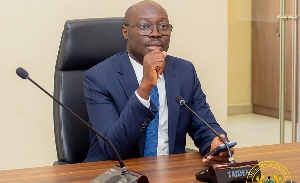 Dr Cassiel Ato Forson is the Minister of Finance
Dr Cassiel Ato Forson is the Minister of Finance
Minister of Finance, Dr Cassiel Ato Forson, has stated that Ghana’s ability to respond to recent fiscal and external shocks was significantly weakened due to the depletion of financial buffers before the current administration took office.
Presenting the 2025 Mid-Year Budget Statement to Parliament on Thursday, July 24, 2025, Dr Forson said the economic safety mechanisms that should have cushioned the country against crises had been severely compromised before the ruling NDC government came into power.
“At the time we took over, the buffers needed to cushion us against fiscal and external shocks had been depleted. Some had been drawn down completely, others collateralised, and others simply non-existent,” he said.
He noted that this lack of a financial safety net left the new administration with limited options to address rising debt levels, revenue shortfalls, and global economic turbulence.
“This government was literally handed an economy with no airbag. The situation we inherited made the early months of this administration exceptionally difficult,” he indicated.
According to him, the absence of adequate reserves and contingency frameworks placed enormous pressure on public finances and limited the government’s ability to respond swiftly to both domestic and international economic challenges.
Despite these setbacks, Dr Forson assured Parliament and the public that government is taking deliberate steps to rebuild the country’s financial buffers, restore macroeconomic stability, and strengthen public financial management systems.
He called for national unity, responsible governance, and sustained fiscal discipline to rebuild resilience and protect the economy from future shocks.
MRA/VPO
Meanwhile, watch as KOD cites diaspora investment as the key to Africa’s rise:
‘We won’t be part of proceedings while violence persists’ – Annoh-Dompreh on Minority walkout
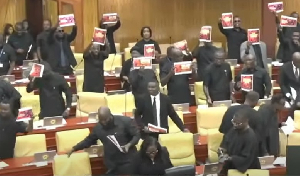 The Minority in Parliament has staged a walkout ahead of the 2025 Mid-Year Budget Review
The Minority in Parliament has staged a walkout ahead of the 2025 Mid-Year Budget Review
The Minority Caucus in Parliament staged a walkout ahead of the presentation of the 2025 Mid-Year Budget Review in protest of alleged government inaction on violent attacks during the recent election rerun in Ablekuma North.
The walkout on Thursday, July 24, 2025, ahead of the presentation of the 2025 Mid-Year Budget Review, was to protest the violence that marred the recent parliamentary rerun in Ablekuma North among other issues the Minority demands urgent action on.
The caucus cited voter intimidation, violence, and the abuse of state security agencies as ills that marred the Ablekuma North election rerun which led to the voting of a new Member of Parliament for the constituency.
According to the Minority, these actions amount to a serious breach of democratic principles and electoral fairness.
Minority Chief Whip, Frank Annoh-Dompreh, speaking in Parliament before the walkout, said the caucus could not in good conscience remain part of proceedings while such violations went unaddressed.
“Mr Speaker, with all due respect, I will not on any day defy your authority. We have lined up a number of activities to battle these demands, and to the extent that this violence visited on Ghanaians are not addressed, we cannot be part of the presentation of the mid-year budget review,” he stated.
The walkout provoked strong reactions from the majority side of the House with some MPs hooting and jeering at them as they (Minority) exited the chamber.
The Ablekuma North rerun has since become a flashpoint in national politics with calls from civil society and opposition leaders for an independent probe into the events that unfolded on that fateful day.
MRA/VPO
Meanwhile, watch as KOD cites diaspora investment as the key to Africa’s rise:
Gov’t to rehabilitate 5,000km of roads across 166 constituencies
The Minister of Finance, Dr. Cassiel Ato Forson, has announced a major government plan to address critical road infrastructure gaps across the country, with a focus on roads in 166 constituencies identified as being in urgent need.
Presenting the 2025 Mid-Year Budget Review in Parliament on Thursday, July 24, Dr. Forson said the government had programmed the rehabilitation of 10 kilometres of roads annually in each of the selected constituencies over the next three years.
“The government has identified 166 constituencies in dire need of road infrastructure. In response, we have programmed to rehabilitate 10km of roads annually in each of these constituencies,” he told Parliament.
According to the finance minister, this initiative will see a total of 5,000 kilometres of roads reconstructed across the 166 constituencies by 2028.
“Mr. Speaker, this translates to about 5,000km of roads to be reconstructed in these 166 constituencies over the next three years,” he added.
| # | Project Description |
|---|---|
| 1 | Construction of a new bridge on the Oti River at Dambai |
| 2 | Rehabilitation of Wa – Han Road |
| 3 | Upgrading of Tumu – Hamile Road |
| 4 | Upgrading of Tumu – Han – Lawra Road |
| 5 | Reconstruction of Navrongo – Tumu Road |
| 6 | Rehabilitation of Techiman – Nkonsia – Wenchi Road |
| 7 | Rehabilitation of Wenchi – Sawla Road |
| 8 | Construction of Sungani Outer Ring Road |
| 9 | Construction of Kumasi Outer Ring Road (Eastern Quadrant) |
| 10 | Rehabilitation of Gibitri – Nakpanduri Road |
| 11 | Rehabilitation of Dodo Pepesu – Nkwanta Road |
| 12 | Rehabilitation of Atimpoku – Asikuma Junction Road |
| 13 | Rehabilitation of Asikuma Junction – Anyirawasi Road |
| 14 | Reconstruction of Anyirawasi – Ho Titrinu Road |
| 15 | Upgrading of Akosombo–Gyakiti–Kudikope Road |
| 16 | Upgrading of Asikuma to Anum Boso–Kpalime Road |
| 17 | Upgrading of Adomi Bridge to Akwamufie Road |
| 18 | Rehabilitation of Ho – Kpetoe Road |
| 19 | Rehabilitation of Kpetoe – Afiadenyigba Road |
| 20 | Rehabilitation of Afiadenyigba – Penyi Road |
| 21 | Rehabilitation of Penyi – Aflao Road |
| 22 | Dualisation of Winneba – Mankessim Road |
| 23 | Dualisation of Cape Coast – Takoradi Road |
| 24 | Rehabilitation of Mankessim – Ajumako – Breman Asikuma – Agona Swedru Road |
| 25 | Rehabilitation of Tema – Aflao Road (Section 1) |
| 26 | Reconstruction of Dodowa – Afienya – Dawhenya Road |
| 27 | Upgrading of Ojubji – Appolonia – Afienya Road |
| 28 | Construction of Enchi – Elubo Road |
| 29 | Construction of Dadieso – Akomtomra Road |
| 30 | Upgrading of Adwofua – Oseiokjokrom Road |
| 31 | Upgrading of Enchi – Kudjouru – Pekyi Road |
| 32 | Upgrading of Bediako Junction – Camp 15 – Sefwi Adabokrom Road |
NHIS Levy, COVID-19 Levy to be abolished in 2026 – Finance Minister
Affo-Toffey, Gyakye Quayson among four to be vetted by Parliament on Friday
The final batch of President John Dramani Mahama’s deputy ministerial nominees will be vetted by the Parliament’s Appointments Committee today, Friday, July 25.
The nominees include Dorcas Affo-Toffey as Deputy Minister for Transport, James Gyakye Quayson for the Ministry of Foreign Affairs, Mohammed Adam Sukparu for Communication, Digital Technology, and Innovation, and Grace Ayensu-Danquah as Deputy Minister of Health.
Dorcas Toffey has been nominated to serve at the Ministry of Transport; James G. Quayson
Gold exports from small-scale sector stood at 51.5 tonnes
By Morkporkpor Anku
Accra, July 24, GNA – Dr Ato Forson, the Minister for Finance, says gold exports from the small-scale sector stood at 51.5 tonnes valued at approximately US$5 billion in the first half of 2025 alone.
This figure far exceeds 26.4 tonnes with a value of US$1.8 billion from the small-scale mining sector over the same period in 2024.
Dr Forson said this when he presented the 2025 Mid-Year Budget Review in Parliament in Accra on the theme: “Resetting the Economy for the Ghana We Want.”
He said since its establishment in April 2025, the Ghana Gold Board (GOLDBOD) had initiated reforms to the licensing regime that governed the local gold trading sector and introduced new aggregation systems to effectively mop up gold from the artisanal, small-scale mining sector across the country.
He said these measures had already yielded tangible economic benefits within the short period of operation of GOLDBOD.
The Minister said simply put gold exports, in tonnes, from the small-scale mining sector for the first half of 2025 recorded about 100 per cent increase, over what was recorded in the same period last year.
Similarly, the value of gold exports from small-scale mining increased by about 180% for the first half of 2025, over that of the same period in 2024.
He said for the first time in Ghana’s history, gold exports from the small-scale mining sector had exceeded gold exports from the large-scale sector.
Dr Forson said the substantial foreign exchange inflows from the GOLDBOD’s operations in the artisanal, small-scale mining sector, had significantly strengthened the country’s reserves, improved the balance of payments and provided critical support to the Ghana Cedi.
“Mr. Speaker, this tells a story. A story of a country which has been denied the full benefits of its gold resources,” he added.
He said a story of a country where illegal gold trade and smuggling had been allowed to fester to the detriment of the wellbeing of the people.
He said on July 8, 2025, the President inaugurated a task force to tackle illegal goldtrade and smuggling.
He reiterated that the government would deal ruthlessly with anyone found engaging in illegal gold trade and smuggling, as these nation-wrecking activities sabotage the progress of the people.
GNA
Christian Akorlie


